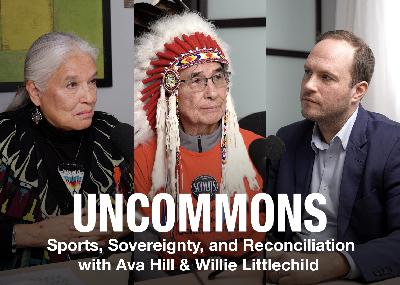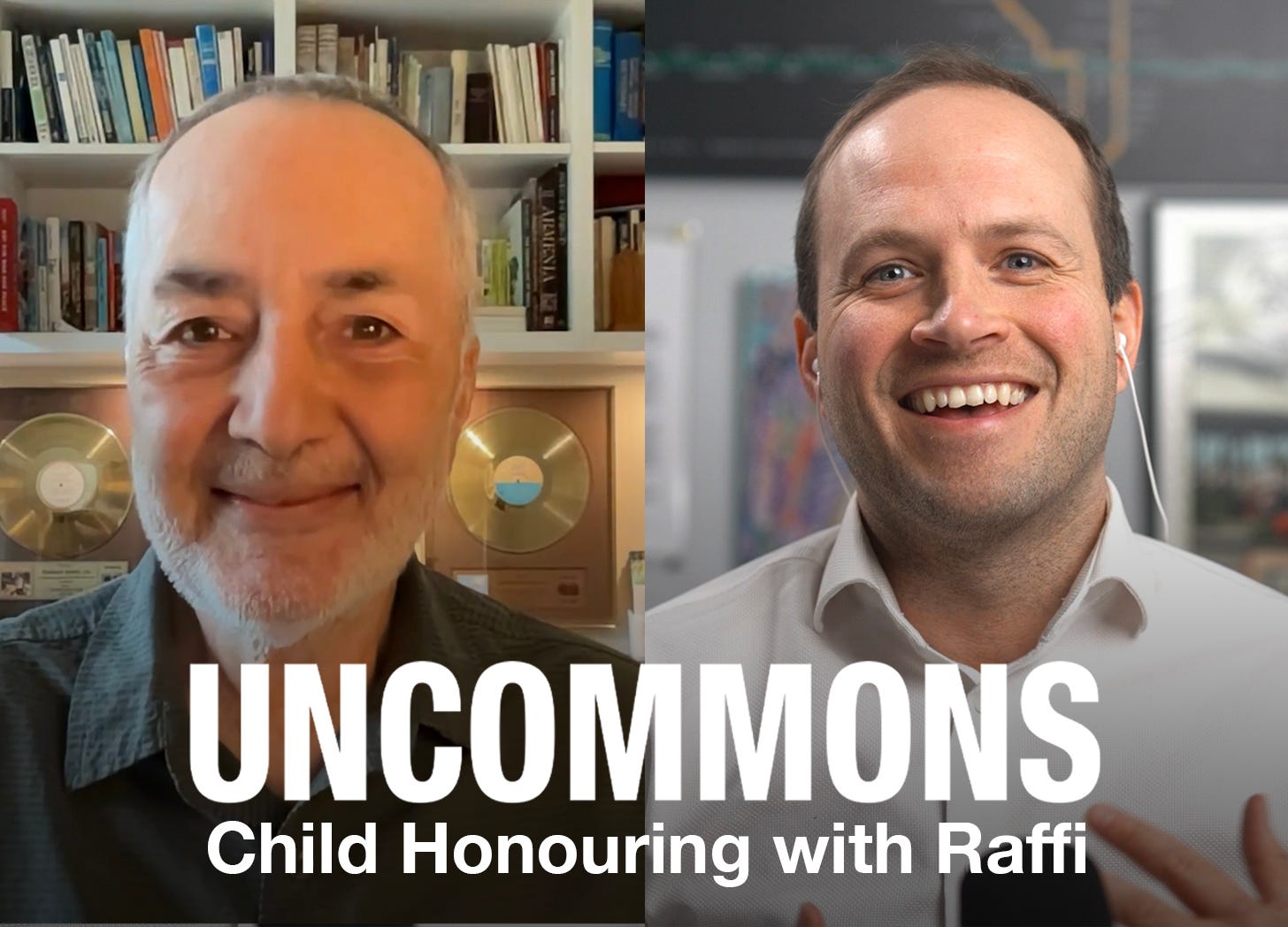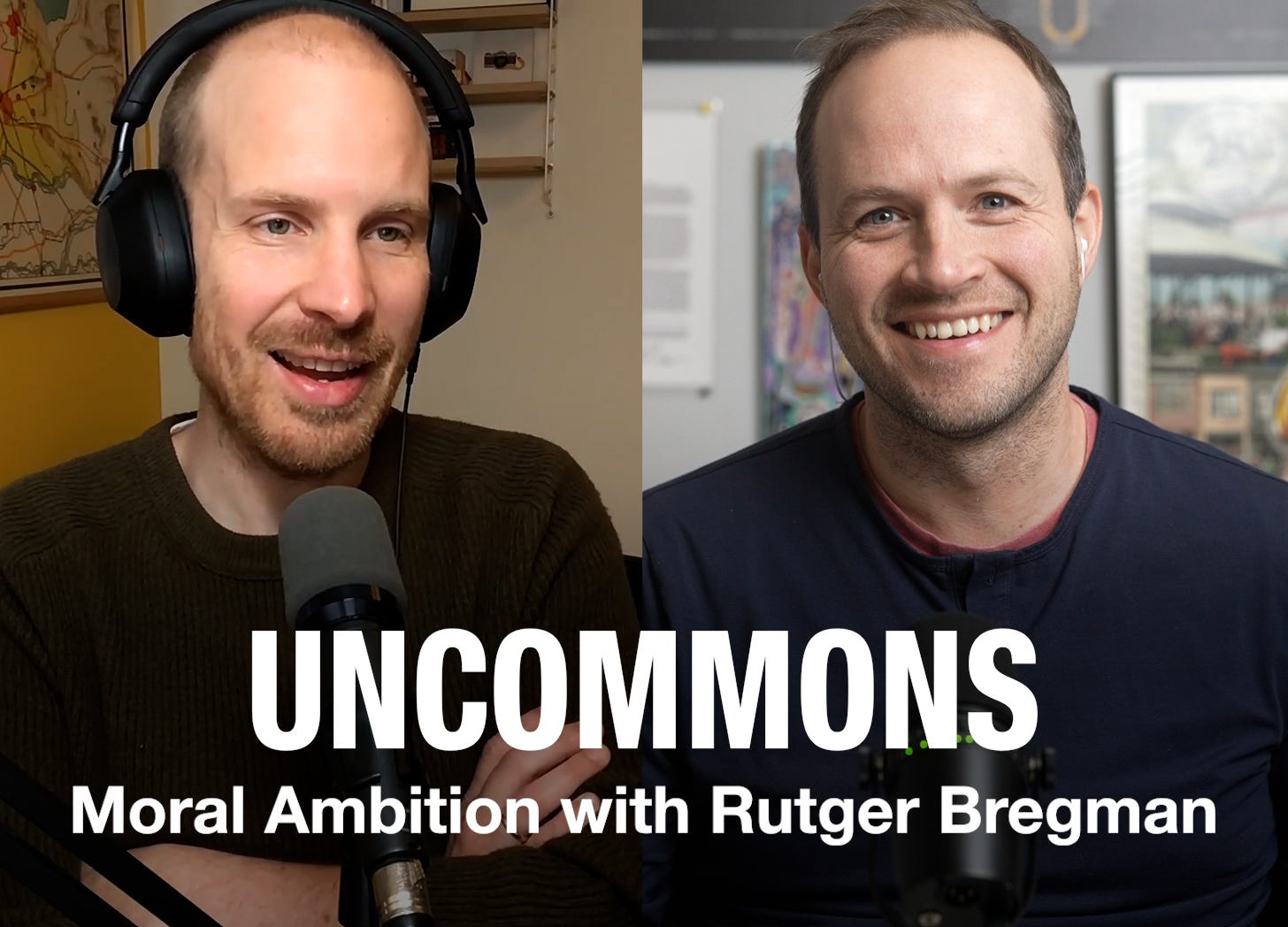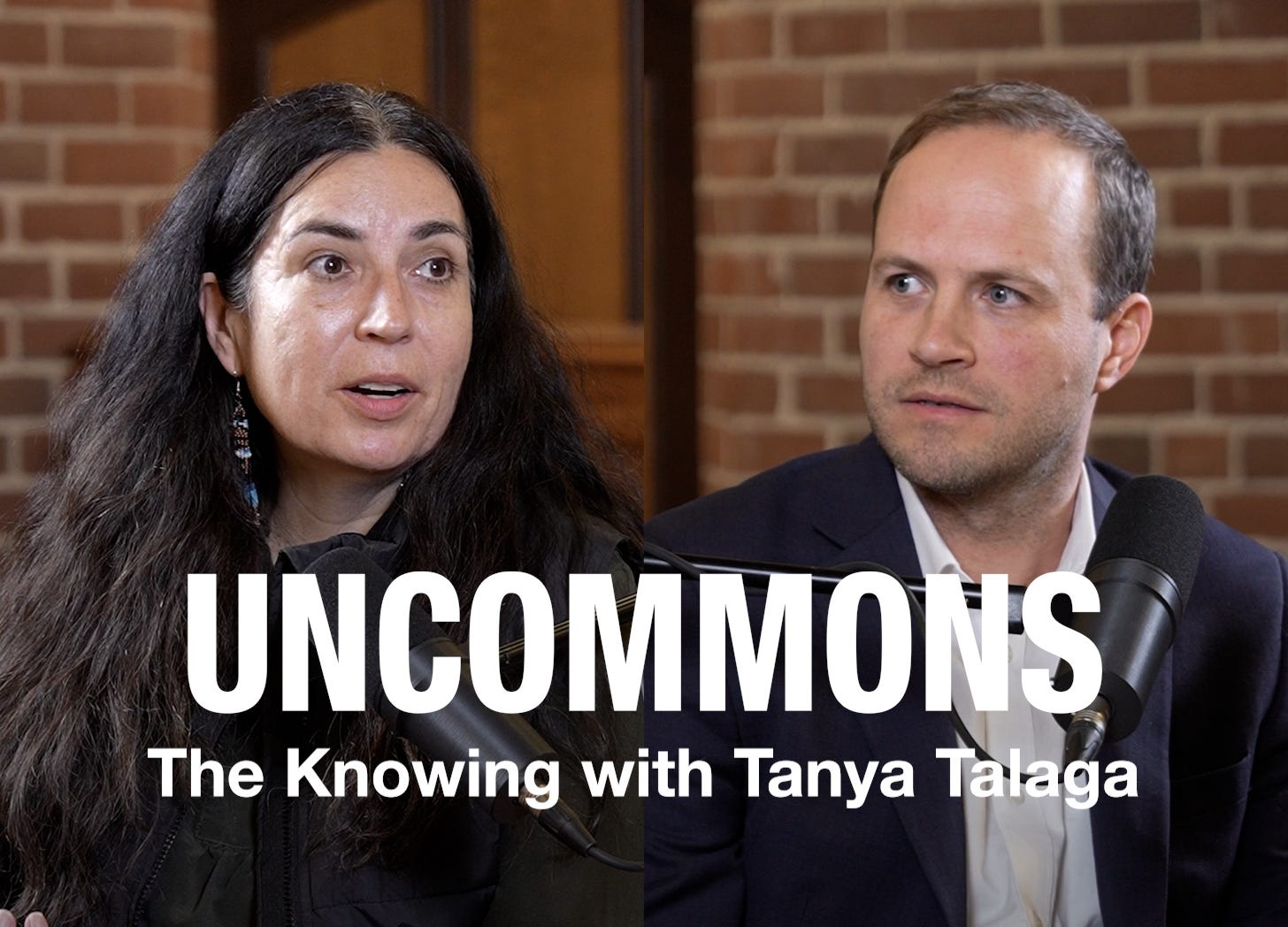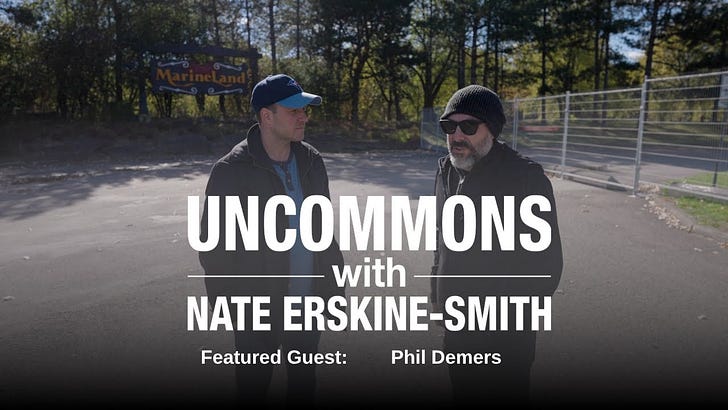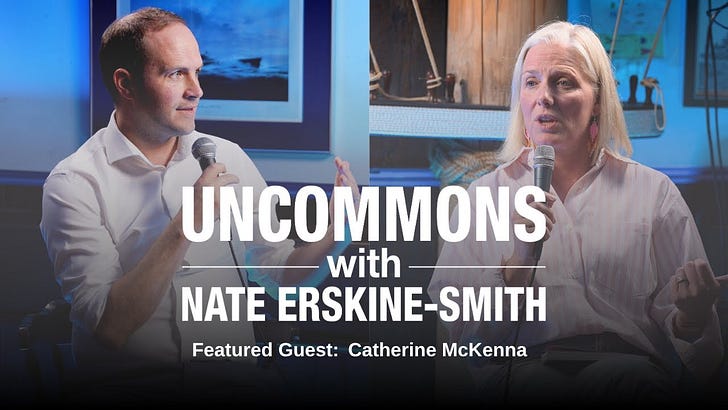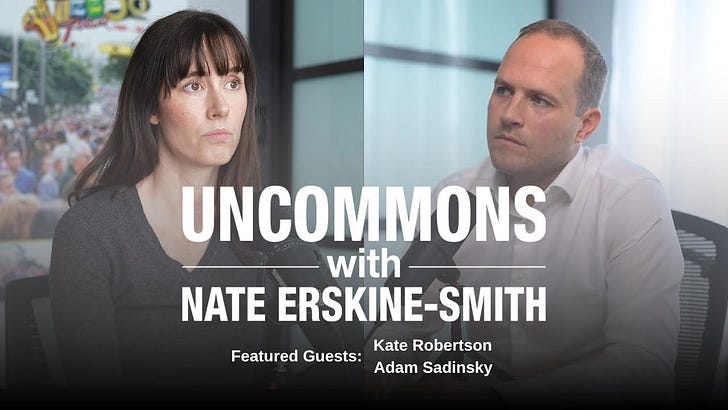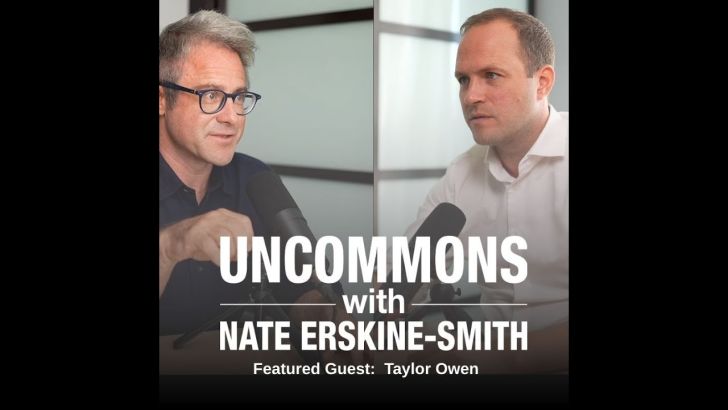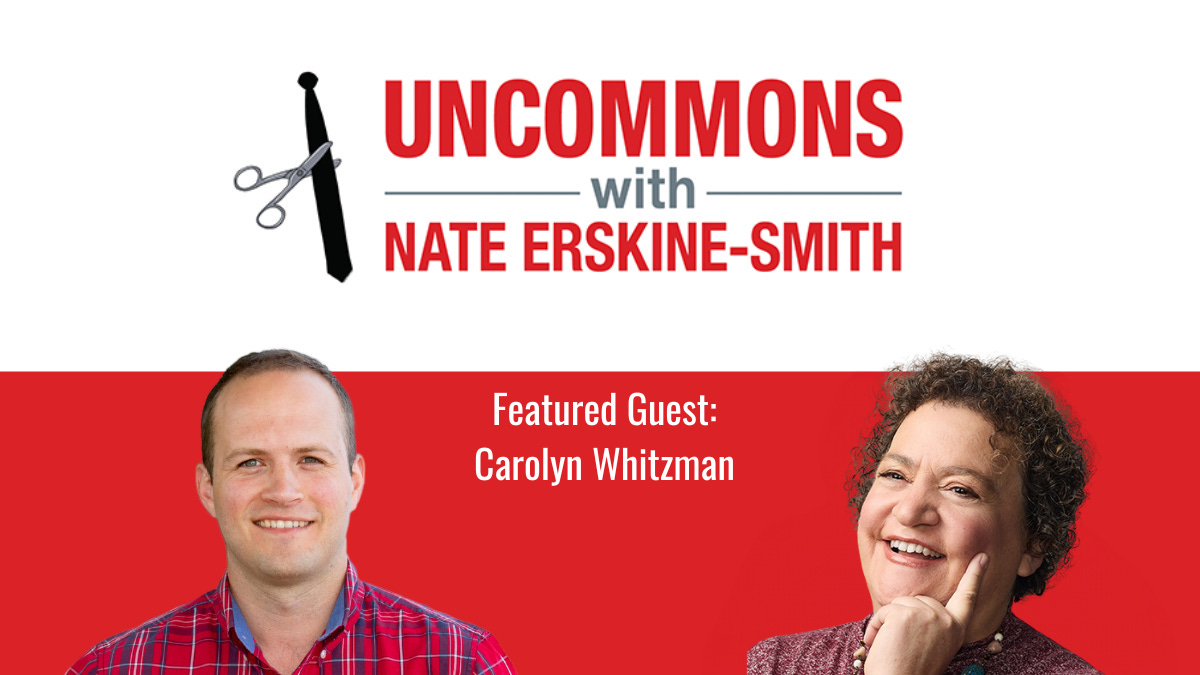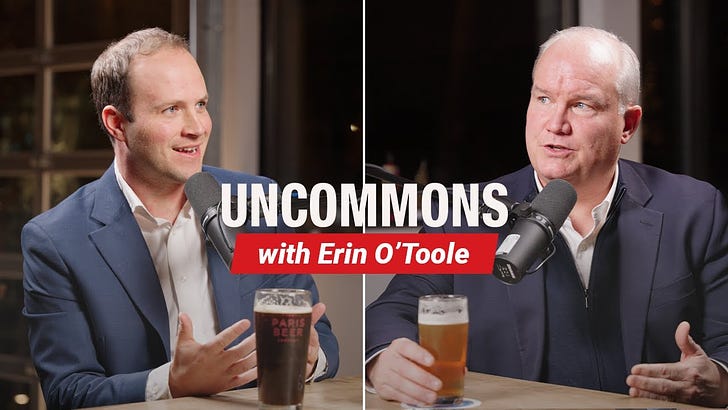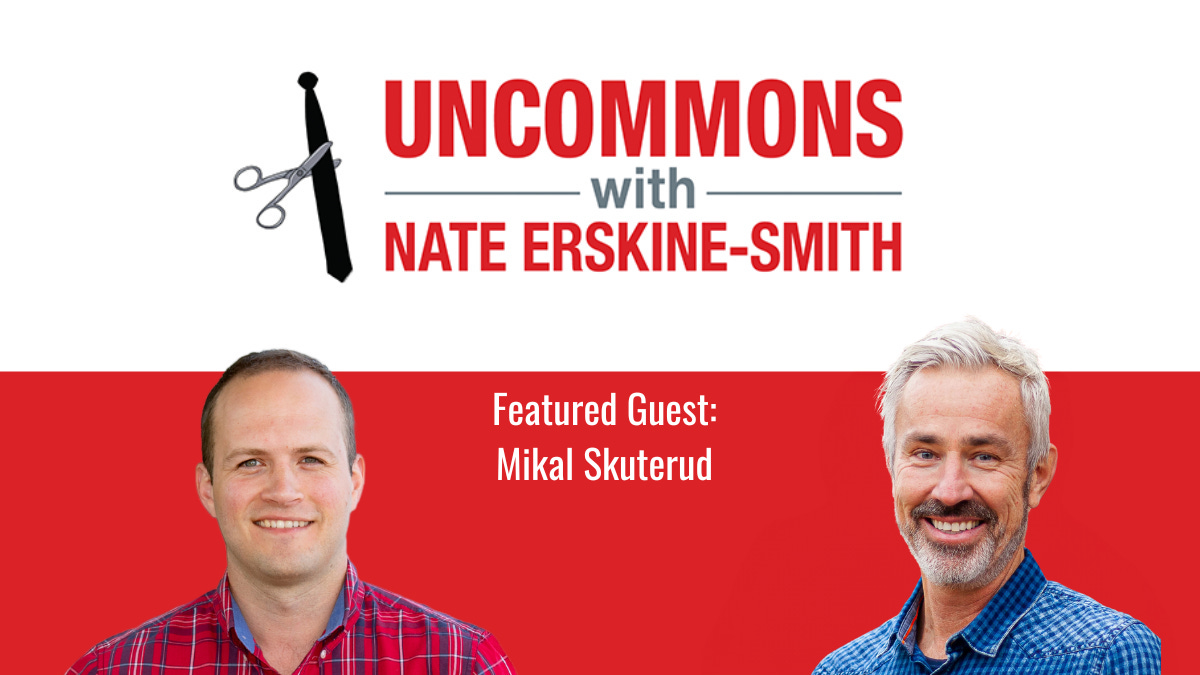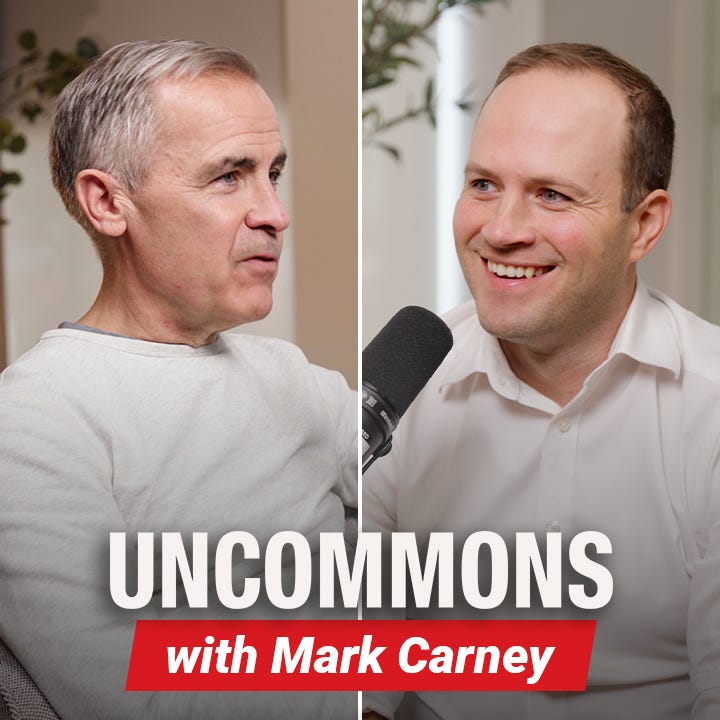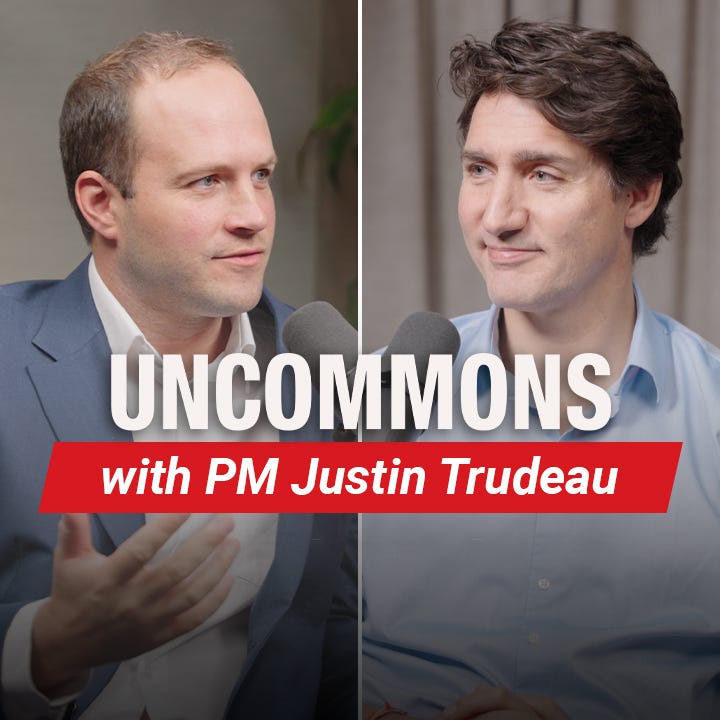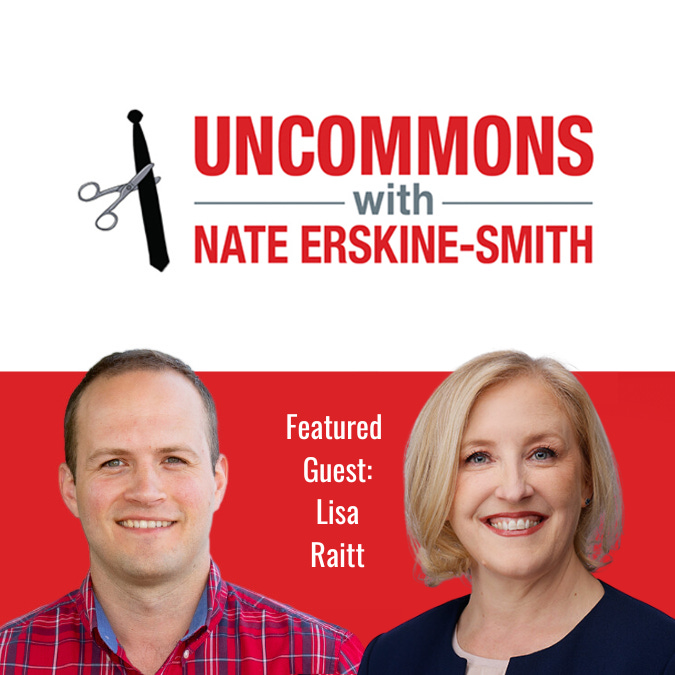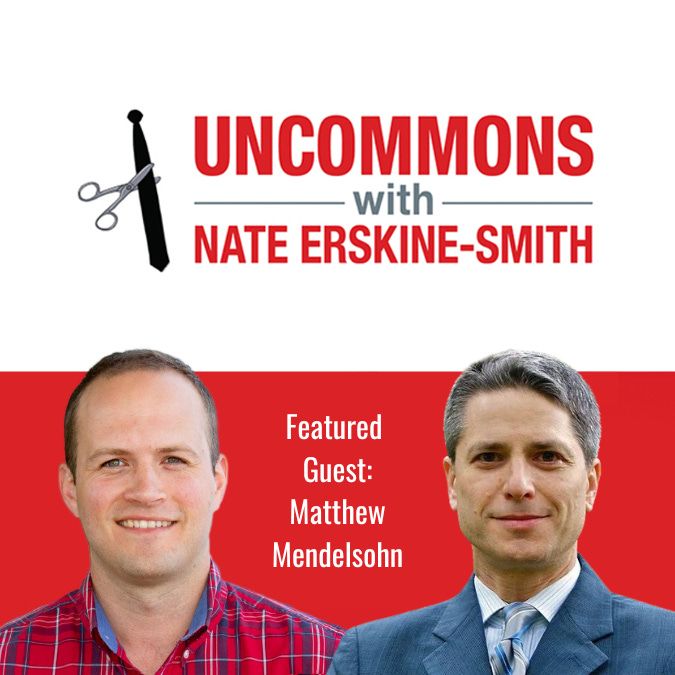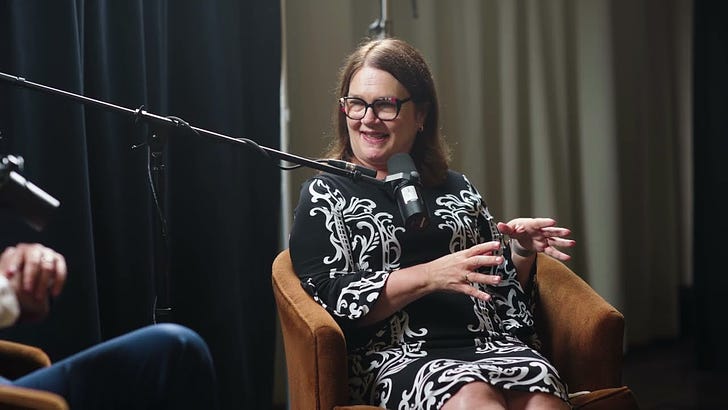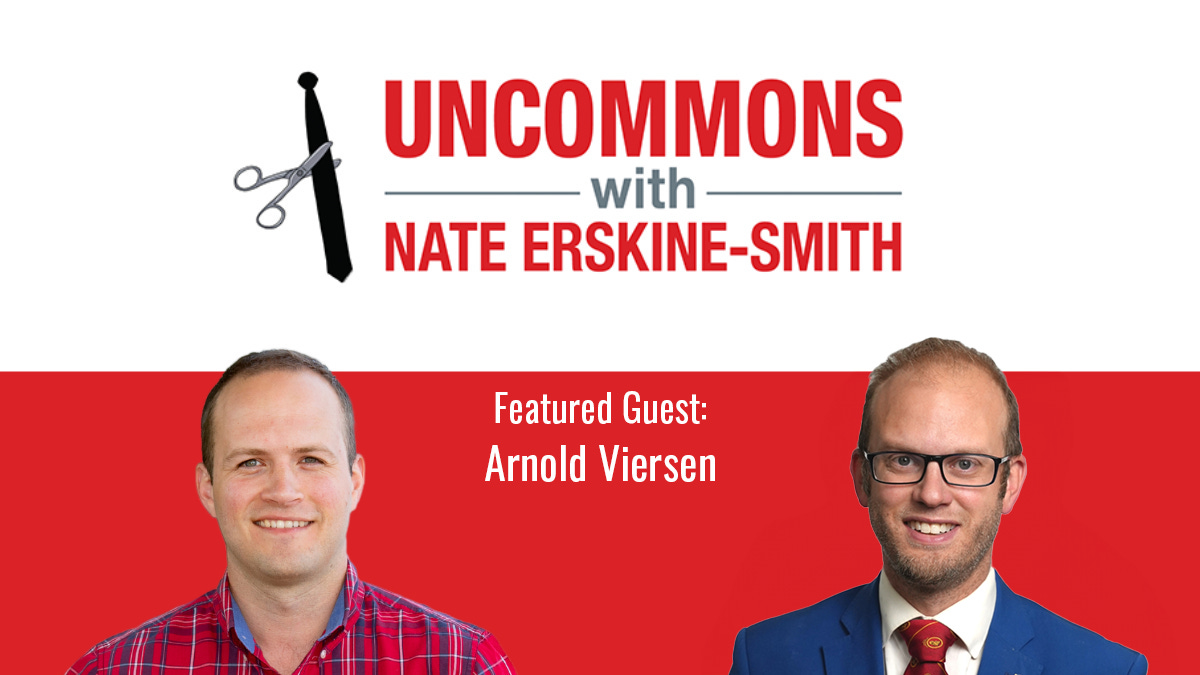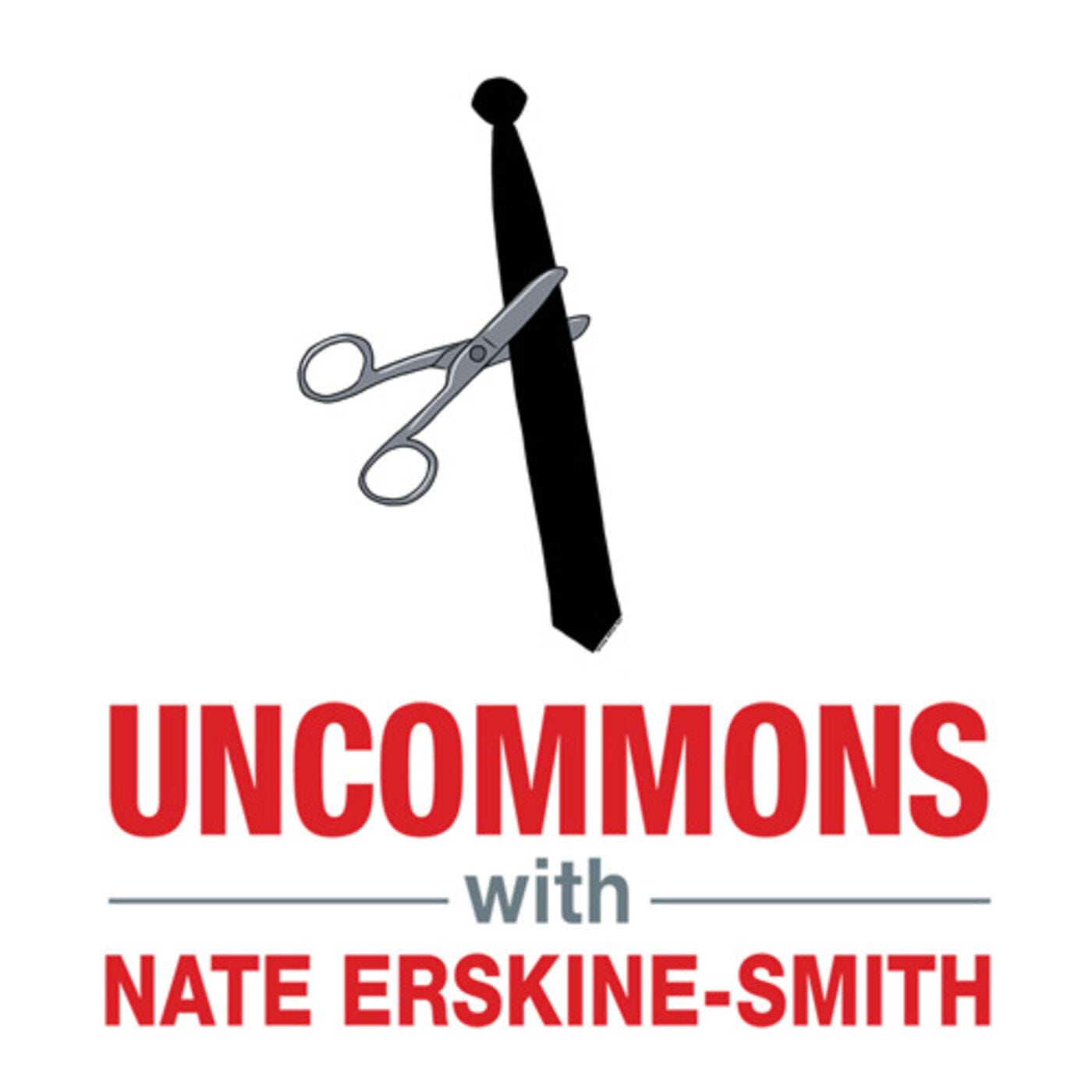Discover Uncommons with Nate Erskine-Smith
Uncommons with Nate Erskine-Smith

Uncommons with Nate Erskine-Smith
Author: Nate Erskine-Smith
Subscribed: 80Played: 2,031Subscribe
Share
© Nate Erskine-Smith
Description
A discussion series hosted by MP Nate Erskine-Smith featuring experts, fellow parliamentarians, and other elected officials of all stripes.
www.uncommons.ca
www.uncommons.ca
150 Episodes
Reverse
Today marks the tenth anniversary of the Truth and Reconciliation Commission’s final report. We’ve seen significant albeit imperfect progress since and there’s much more for us to do together.On this episode of Uncommons, I’m joined by Ava Hill and Willie Littlechild, two incredible Indigenous leaders. We talk about the state of reconciliation and what real partnership could and should look like, with a specific focus on their work to advance Indigenous participation in sport.Ava Hill is a former Six Nations Chief, and Willie Littlechild is a former TRC commissioner, former MP, and residential school survivor. This is a public episode. If you would like to discuss this with other subscribers or get access to bonus episodes, visit www.uncommons.ca
Like many Canadians, Nate grew up on Raffi’s music. On this episode, Raffi joins Nate to discuss his musical journey, his ongoing advocacy for the peace and the planet, and why we need to centre children in our decision-making through his philosophy of child honouring. You can learn more about that philosophy via the “Raffi Foundation for Child Honouring”, but the idea is to emphasize the importance of respect, joy, and purpose in children’s lives and its potential to transform society.They also touch on Raffi’s advocacy against fascism, the power of music in activism, the urgent need for climate mobilization, protecting children from digital harm and his belief in having courage to speak out and be engaged in democracy.Raffi is a global troubadour, children’s entertainer, author and founder of the Raffi Foundation for Child Honouring. Called by the Washington Post as “the most popular children’s singers in the English-speaking world”. This is a public episode. If you would like to discuss this with other subscribers or get access to bonus episodes, visit www.uncommons.ca
Rutger Bregman is a Dutch historian, best-selling author, and co-founder of the School for Moral Ambition. His recent book and school both encourage us to spend our time and talent by making a difference on the greatest challenges and injustices of our time, rather than solely personal comfort and financial gain.Rutger joins me in this episode to explore how his ideas on moral ambition connect to social change, the big challenges we need your talent to solve, and what he hopes to accomplish with his new school. This is a public episode. If you would like to discuss this with other subscribers or get access to bonus episodes, visit www.uncommons.ca
Tanya Talaga is an award-winning author and journalist and a powerful voice for Indigenous rights and education in Canada.She’s also a constituent, which is how we happened to connect again recently when she was hosted by the House Speaker together with other finalists for the Shaugnessy Cohen Prize in political writing.Talaga joined me a number of years ago at the Fox Theatre to talk about her 2017 award-winning book Seven Fallen Feathers.This conversation focuses on her recent book, The Knowing. It is a deeply personal story in which she traces her own family’s history, and it is a story of Indigenous people in Canada, injustice, reclamation, and outlasting.With her own background one of both Anishinaabe and Polish descent, Talaga writes: “From the legacies of these dual branches of genocide, one on Turtle Island and one far off in eastern Europe - comes my knowing.”I recommend reading the book and you can also watch her docuseries at CBC Gem. This is a public episode. If you would like to discuss this with other subscribers or get access to bonus episodes, visit www.uncommons.ca
Phil Demers joins me outside the gates of Marineland for this episode- a return to a conversation we began seven years ago at the Fox Theatre.Back then, we were fighting to pass Bill S-203 to end whale captivity in Canada. The law passed in 2019.Now, the fight is to save the remaining 30 beluga whales and 500 other animals who remain trapped inside as the park has ceased to exist. At one point, recently, Marineland even threatened to euthanize the whales if governments didn’t provide emergency financial support.Phil “The Walrus Whisperer” Demers was a trainer at Marineland turned whistleblower. He spent over a decade fighting Marineland in court after leaving his job there in 2012. After 13 years of legal battles and public advocacy, Marineland is finally on its last legs. But the fight to save the remaining animals isn’t over.We discussed what happens next, short-term and long-term solutions, and why governments should lead on this instead of playing only a reactive role.Chapters:0:00 Standing Outside Marineland6:21 Why China Might Actually Be Better10:04 The Sanctuary Myth & Rescue Reality14:08 30 Dead Whales18:13 500 Forgotten Animals19:30 13 Years of Legal Hell24:37 Conclusion: The Divorce AnalogyRead further:The Walrus and the Whistleblower - Documentary (CBC Gem) https://www.cbc.ca/documentarychannel/docs/the-walrus-and-the-whistleblower7 years ago with Phil: Transcript: [00:00:00] Nate Erskine-Smith: All right, well, welcome to Uncommons. It’s an interesting episode because I’m joined by Phil Demers, who actually joined me at the Fox Theater many years ago, four years ago before we started the podcast actually. And it was just a, a local town hall event. We showed Blackfish. Right. And you were there to talk about your experience as a whistleblower at this horrible place behind us.[00:00:19] Uh, it is interesting how far we’ve come, but also that the issue is so acute still. Uh, at the time we were talking about a bill that had to be passed. To end this kind of production and make sure we were protecting institutions in captivity. And you were adamant we had to get this bill passed. Hmm. Well we got the bill passed.[00:00:37] Yeah. And yet we’ve got marineland, uh, beside us now, and it was grandfathered through in a way. And now we’ve got 30 beluga whales. We’ve got 500 other animals that are, that are in here. Mm-hmm. And all of which, all, all of whom need to be saved in, in, in one way or another. And, uh, it didn’t [00:01:00] have to come to this, really did it.[00:01:02] Phil Demers: Well, we’ve, what, what has glossed over in much of, of your story is we’ve got a unwilling marine land in all of that. Yes. To evolve in any way, shape or form to be a, financially viable, uh, you know, for the security of their own future. Uh, but b, to adhere to any of the laws that we essentially passed, both provincially and, uh, and federally, although we did ban the breeding of the whales. Yep. Had we not banned the breeding of the whales. So, so currently there’s 30 belugas remaining. There’s four dolphins. Uh, we got two sea lions and a, and a host of, uh, land animals there. Had we not banned the breeding of belugas in 2019?[00:01:41] Nate Erskine-Smith: Yep.[00:01:42] Phil Demers: And albeit, the pregnant belugas of 2019 were grandfathered in.[00:01:47] So there were some whale birth births there. On average, Marineland had five to seven belugas born per year. A couple would die. But there’s, you know, it’s conceivable to say that whereas [00:02:00] we have 30 right now in there, we would have had an excess of 50. Right. They would’ve kept probably 60.[00:02:05] Nate Erskine-Smith: Yes, of course they would’ve kept the business model broke down with that law.[00:02:08] But if they would’ve kept going otherwise, I mean, they’re, they were the bad actors. It’s the, it just wants to keep it active [00:02:12] Phil Demers: At this point. It’s the only, it’s the only part of the law that they’ve, ad they’ve adhered to outside of importing, of course, which, which, uh, we ban. So it’s, it’s beyond their control, but.[00:02:21] Um, you know, the breeding, they, they stopped, but had they not, we’d be talking about 50 to 60 whales in those tanks. It, it was, uh, you know, that’s something to really hang our hat on. That was a huge, uh, and super progressive, uh, lawsuit. But it does interestingly, take us to this place now where marine land is, you know, we essentially bankrupt.[00:02:39] I, but we should stress owns a lot of land sitting on 700 acres of prime land meant to fuel or feed the, uh, the whole family trust. That’s, those are the heirs to it. You know, the operation is essentially sucking the money out of that. And so they’re looking for the, be it most lucrative or least expensive [00:03:00] way to get outta this thing.[00:03:01] The sale to China was to be a profitable one. Uh, should be stressed that here in North America, none of the facilities wanna do business with marine land, right? A few years ago, five belugas were sent to Mystic Aquarium, three of which died within weeks and months. Uh, all having to do with, uh, preexisting conditions from Marineland.[00:03:20] Nate Erskine-Smith: So, so pause, pause for a moment. ‘cause I think for those who are listening, they may not know you’ve got 30 belugas here. And there was, uh, a deal that Marine Land wanted a broker, at least with a facility in China. Ocean Kingdom time, long Ocean Kingdom. The decision of the federal minister was to say no animal welfare first.[00:03:41] Uh, the primary purpose here is entertainment and, and we’re not convinced that they’re gonna be putting animal welfare first. Akin to the concern here, right? And, and why we don’t want this to contain to exist. But then the knock on question why is so acute right now is okay, but then what? Because marine land comes out as proper monsters. They say, well, if we don’t get emergency funding, we’re gonna, we’re gonna euthanize these whales,[00:04:05] Phil Demers: which is a familiar theme with Marineland. In all of my years of dealing with them, it was always do this or else. Uh, again, I I, this morning alone, I watched a, a YouTube video. It was pretty.[00:04:14] Pretty thorough history of marine land and in it is always the familiar threat of, well, if you don’t do this, I’m gonna, and it includes ship the park to the, to the US that includes, you know, a whole host of things. But that’s all, that’s marine land’s bluster when it, they don’t get their way right. But that said, the, the spirit of the law was to give, uh, to give final say to the minister so that they can ultimately consider the interests of the animals in it, which is a level of personhood, which is not.[00:04:39] Which is atypical of most laws, especially of animals.[00:04:40] Nate Erskine-Smith: Of, yeah. Yeah. An incredibly important step. Yeah.[00:04:43] Phil Demers: Really, really, uh, progressive, you know, the spirit is to end captivity and, you know, and if you can stamp that out here, the, the idea is that it, it’s, uh, it’ll evolve to the rest of the world. And to be fair, uh, France adopted a very similar law recently passed, [00:05:00] uh, as well as, uh, new South Wales.[00:05:02] The province in Australia adopted a law. It’s actually picking up around the world. So, so it’s, you know. I always stress when we, we look at, hey, we wanna end captivity, I always stress that’s a hundred year, that’s a hundred year fight. If all goes extremely well, you know, you’ve got burgeoning business in China, some in Russia, right?[00:05:20] And we’re still ending sort of ours here, sort of choking that off here and that’s still expanding there. So, you know, we’ve, we’ve started something that’s gonna continue elsewhere, but you know, it’s gotta end here. It’s gotta end here first and ending.[00:05:33] Nate Erskine-Smith: You can put a law on the books and, okay, so. Uh, on a going forward basis, you, you might avoid problems and, and avoid cruelty, but you still have 30 belugas here.[00:05:44] And then the question becomes, well, what happens next? And, and I don’t wanna pretend that it’s just a marineland problem because you were just, uh, commenting on the fact that in Miami you got seaquarium that’s now shut down, that this is going to happen in other places too. Well of Mexico just banned it.[00:05:59] Phil Demers: [00:06:00] And now all of their animals, now captive and legally captive can no longer perform in shows, can no longer do the swim with programs, et cetera, et cetera. So what happens is it becomes unviable to the owners. They lose their incentive, their incentive to have and use these animals. So what becomes well, unfortunately, in, in, in my estimation of what is available to us.[00:06:20] Nate Erskine-Smith: Yeah.[00:06:21] Phil Demers: You know, I’d always had hope that the much of these animals would go to the us, but it’s not gonna happen by way of a broker deal because again, none of ‘em wanna touch marine land for obvious reasons. Again, I, I mentioned the five whales that died at, uh, mystic.[00:06:33] Nate Erskine-Smith: Yep.[00:06:34] Phil Demers: They also know of the bad PR.[00:06:36] Marine land’s been getting here for the decades. I mean, it’s been global news, you can’t ignore it. So SeaWorld also had to sue Marine Land a number of years ago to get an orca back. So SeaWorld doesn’t wanna touch marine land, so I don’t think. Anyone in the US wants to associate with buying animals off marine land or brokering any type of deal affiliations, et cetera, et cetera.[00:06:54] But you know, I’d had this hope that this government, the provincial [00:07:00] Animal welfare society, especially with their policing powers and their ability to seize animals. You know, you have, you have essentially an opportunity to seize these animals and send them to these places, whereas those places might be receiving of them if they’re by way of a rescue versus of, of a broker deal.[00:07:15] But again, t
Catherine McKenna joined me in person for a live recording of this episode at the Naval Club of Toronto here in our east end. We discussed her new book ‘Run Like a Girl’, lessons learned from her six years in federal politics, the reality of political harassment, the tension between party loyalty and telling it like it is, and why we should be wary of “grand bargains” on climate with oil and gas companies.Catherine served as Environment and Climate Change Minister from 2015-2019 and Infrastructure Minister from 2019-2021. She’s now the founder and CEO of Climate and Nature Solutions and chairs a UN expert group advising the Secretary General on net zero commitments.Read further:Run Like A Girl - Catherine McKenna (2025)https://www.catherinemckenna.caChapters:00:00 Introduction & Run Like A Girl Book05:32 Lessons from Politics: Hard Work & Balance08:52 Climate Barbie & Political Harassment15:26 Running for Office in Ottawa Centre23:17 Being a Team Player vs. Speaking Truth32:05 Leaving Politics40:30 Climate Policy & the Oil & Gas “Grand Bargain”48:24 Supporting Others in Politics52:56 Carbon Pricing Communication Failures59:13 Gender Balance, Feminism & Cabinet01:04:04 Final Thoughts & ClosingTranscript:Nate Erskine-Smith00:02 - 00:38Well, thank you everyone for joining. This is a live recording of the Uncommon’s podcast, and I’m lucky to be joined by Catherine McKenna, who has a very impressive CV. You will know her as the former Environment Minister. She is also the founder and CEO of Climate and Nature Solutions, a consultancy focused on all things environment and nature protection. And you may or may not know, but she’s also the chair of a UN expert group that gives advice to the Secretary General on net zero solutions. So thank you for coming to Beaches East York.Catherine McKenna00:38 - 00:56It’s great to be here. Hello, everyone. And special shout out to the guy who came from, all the way from Bowmanville. That’s awesome. Anyone from Hamilton, that’s where I’m originally found. All right. Nice, we got a shout out for Hamilton. Woo-hoo.Nate Erskine-Smith00:57 - 01:19So I ran down a few things you’ve accomplished over the years, but you are also the author of Run Like a Girl. I was at, you mentioned a book launch last night here in Toronto, but I attended your book launch in Ottawa. And you can all pick up a book on the way out. But who did you write this book for?Catherine McKenna01:21 - 02:58So, I mean, this book has been a long time in the making. It’s probably been five years. It was a bit of a COVID project. And you’ll see, it’s good, I’ve got my prop here, my book. But you’ll see it’s not a normal kind of book. So it has a lot of images of objects and of, you know, pictures, pictures of me getting ready to go to the state visit dinner that was hosted by Obama while I’m trying to finalize the text on climate. So it’s got like random things in it, but it’s intended for a much broader audience. It’s really intended to inspire women and girls and young people. And I think that’s particularly important right now because I work on climate and I think it’s really hard. Do people here care about climate? Yes, I imagine here you care about climate. I mean, I actually think most Canadians do because they understand the wildfires and they see the smoke and people are being evacuated from communities and you can’t get insurance if you’re in a flood zone. But I do think in particular we need to bolster spirits. But also it’s a book, it’s really about how to make change. It’s not like people think it’s like a political memoir. So I think, you know, fancy people in politics will look at the end of the book to see if their name is there and maybe be disappointed if it isn’t. But it’s not really that kind of book. It’s like I was a kid from Hamilton. I didn’t want to be a politician. That wasn’t my dream when I grew up. I wanted to go to the Olympics for swimming. And spoiler alert, I did not make the Olympic team, but I went to Olympic trials.Nate Erskine-Smith02:59 - 02:59You’re close.Catherine McKenna03:00 - 04:05I was, well, closest, closest, but, but it wasn’t, I mean, you know, life is a journey and that wasn’t, it wasn’t sad that I didn’t make it, but I think it’s just to hopefully for people to think I can make change too. Like I didn’t come as a fully formed politician that was, you know, destined to be minister for the environment and climate change. So in particular for women and young people who are trying to figure out how to make change, I think it’s a little bit my story. I just tried to figure it out. And one day I decided the best way to make change was to go into politics and get rid of Stephen Harper. That was my goal. He was my inspiration, yes, because we needed a new government. And yeah, so I really, really, really am trying to reach a much broader audience because I think we often are politicians talking to a very narrow group of people, often very partisan. And that’s not my deal. My deal is we need everyone to be making change in their own way. And I want people who are feeling like maybe it’s a bit hard working on climate or in politics or on democracy or human rights that you too can make change.Nate Erskine-Smith04:06 - 05:17And you were holding it up. I mean, it’s a bit of a scrapbook. You’ve described it. And it’s also honest. I mean, there was some media coverage of it that was sort of saying, oh, you said this about Trudeau, calling him a loofer. And there’s a certain honesty about I’ve lived in politics and I’m going to call it like it is. But what I find most interesting is not the sort of the gotcha coverage after the fact. It’s when you go to write something, you said you’re not a writer at the launch that I saw in Ottawa, but you obviously sat down and were trying to figure out what are the lessons learned. You’ve had successes, you’ve had failures, and you’re trying to impart these lessons learned. You mentioned you sort of were going down that road a little bit of what you wanted to impart to people, but you’ve had six years in politics at the upper echelon of decision-making on a really important file. I want to get to some of the failures because we’re living through some of them right now, I think. Not of your doing, of conservative doing, unfortunately. But what would you say are the lessons learned that you, you know, as you’re crystallizing the moments you’ve lived through, what are those lessons?Catherine McKenna05:19 - 07:12It’s funny because the lessons I learned actually are from swimming in a way that actually you got to do the work. That, you know, you set a long-term goal and, you know, whatever that goal is, whatever you hope to make change on. And then you get up and you do the work. And then you get up the next morning and you do the work again. And sometimes things won’t go your way. But you still get up the next morning. And I think it’s important because, like, you know, look, I will talk, I’m sure, about carbon pricing. We lost the consumer carbon price. There’s a chapter. It’s called Hard Things Are Hard. I’m also, like, really into slogans. I used to be the captain of the U of T swim team. So I feel like my whole life is like a Nike ad or something. Hard things are hard. We can do it. But yeah, I mean, I think that the change is incremental. And sometimes in life, you’re going to have hard times. But the other thing I want people to take from it is that, you know, sometimes you can just go dancing with your friends, right? Or you can call up your book club. I would sometimes have hard days in politics. And I was like, oh, gosh, that was like, what? happened. So I’d send an email, it would say to my book club. So if you have book clubs, book clubs are a good thing. Even if you don’t always read the book, that would be me. But I would be SOS, come to my house. And I’d be like, all I have is like chips and wine, but I just need to hang out with regular people. And I think that’s also important. Like, you know, life is life. Like, you know, you got to do the work if you’re really trying to make change. But some days are going to be harder and sometimes you’re just trying to hang in there and I had you know I had I have three kids one of them they’re older now one of them is actually manning the the booth selling the books but you know when you’re a mom too like you know sometimes you’re going to focus on that so I don’t know I think my my lessons are I I’m too gen x to be like you’ve got to do this and INate Erskine-Smith07:12 - 07:16learned this and I’m amazing no that’s not writing a graduation speech I’m not I’m not writing aCatherine McKenna07:16 - 08:43graduation speech and I don’t know that you know the particular path I took is what anyone else is going to do I was going to I went to Indonesia to do a documentary about Komodo dragons because my roommate asked me to so that led me to go back to Indonesia which led me to work for UN peacekeeping and peacekeeping mission in East Timor but I think it’s also like take risks if you’re a young person Like, don’t, people will tell you all the time how you should do things. And I, you know, often, you know, doubted, should I do this, or I didn’t have enough confidence. And I think that’s often, women often feel like that, I’ll say. And, you know, at the end, sometimes you are right. And it’s okay if your parents don’t like exactly what you’re doing. Or, you know, people say you should stay in corporate law, which I hated. Or, you know, so I don’t know if there’s so many lessons as a bit as, you know, one, you got to do the work to, you know, listen to what you really want to do. That doesn’t mean every day you’re going to get to do what you want to do. But, you know, if you’re really passionate about working human rights, work on human rights, like figure out a way to do it and then also have some fun. Like life can feel really heavy. And I felt that during COVID. I think sometimes now after, you know, looking
** There are less than 10 tickets remaining for the live recording of Uncommons with Catherine McKenna on Thursday Oct 2nd. Register for free here. **On this two-part episode of Uncommons, Nate digs into Bill C-2 and potential impacts on privacy, data surveillance and sharing with US authorities, and asylum claims and refugee protections.In the first half, Nate is joined by Kate Robertson, senior researcher at the University of Toronto’s Citizen Lab. Kate’s career has spanned criminal prosecutions, regulatory investigations, and international human rights work with the United Nations in Cambodia. She has advocated at every level of court in Canada, clerked at the Supreme Court, and has provided pro bono services through organizations like Human Rights Watch Canada. Her current research at Citizen Lab examines the intersection of technology, privacy, and the law.In part two, Nate is joined by Adam Sadinsky, a Toronto-based immigration and refugee lawyer and co-chair of the Canadian Association of Refugee Lawyers’ Advocacy Committee. Adam has represented clients at every level of court in Canada, including the Supreme Court, and was co-counsel in M.A.A. v. D.E.M.E. (2020 ONCA 486) and Canadian Council for Refugees v. Canada (2023 SCC 17).Further Reading:Unspoken Implications A Preliminary Analysis of Bill C-2 and Canada’s Potential Data-Sharing Obligations Towards the United States and Other Countries - Kate Robertson, Citizen LabKate Robertson Chapters:00:00 Introduction & Citizen Lab03:00 Bill C-2 and the Strong Borders Act08:00 Data Sharing and Human Rights Concerns15:00 The Cloud Act & International Agreements22:00 Real-World Examples & Privacy Risks28:00 Parliamentary Process & Fixing the BillAdam Sadinsky Chapters:33:33 Concerns Over Asylum Eligibility in Canada36:30 Government Goals and Fairness for Refugee Claimants39:00 Changing Country Conditions and New Risks41:30 The Niagara Falls Example & Other Unfair Exclusions44:00 Frivolous vs. Legitimate Claims in the Refugee System47:00 Clearing the Backlog with Fair Pathways50:00 Broad Powers Granted to the Government52:00 Privacy Concerns and Closing ReflectionsPart 1: Kate RobertsonNate Erskine-Smith00:00-00:01Kate, thanks for joining me.Kate Robertson00:01-00:01Thanks for having me.Nate Erskine-Smith00:02-00:15So I have had Ron Debert on the podcast before. So for people who really want to go back into the archive, they can learn a little bit about what the Citizen Lab is. But for those who are not that interested, you’re a senior researcher there. What is the Citizen Lab?Kate Robertson00:16-01:00Well, it’s an interdisciplinary research lab based at University of Toronto. It brings together researchers from a technology standpoint, political science, lawyers like myself and other disciplines to examine the intersection between information and communication technologies, law, human rights, and global security. And over time, it’s published human rights reports about some of the controversial and emerging surveillance technologies of our time, including spyware or AI-driven technologies. And it’s also really attempted to produce a thoughtful research that helps policymakers navigate some of these challenges and threats.Nate Erskine-Smith01:01-02:50That’s a very good lead into this conversation because here we have Bill C-2 coming before Parliament for debate this fall, introduced in June, at the beginning of June. And it’s called the Strong Borders Act in short, but it touches, I started counting, it’s 15 different acts that are touched by this omnibus legislation. The government has laid out a rationale around strengthening our borders, keeping our borders secure, combating transnational organized crime, stopping the flow of illegal fentanyl, cracking down on money laundering, a litany of things that I think most people would look at and say broadly supportive of stopping these things from happening and making sure we’re enhancing our security and the integrity of our immigration system and on. You, though, have provided some pretty thoughtful and detailed rational legal advice around some of the challenges you see in the bill. You’re not the only one. There are other challenges on the asylum changes we’re making. There are other challenges on lawful access and privacy. You’ve, though, highlighted, in keeping with the work of the Citizen Lab, the cross-border data sharing, the challenges with those data sharing provisions in the bill. It is a bit of a deep dive and a little wonky, but you’ve written a preliminary analysis of C2 and Canada’s potential data sharing obligations towards the U.S. and other countries, unspoken implications, and you published it mid-June. It is incredibly relevant given the conversation we’re having this fall. So if you were to at a high level, and we’ll go ahead and some of the weeds, but at a high level articulate the main challenges you see in the legislation from the standpoint that you wrote in unspoken implications. Walk us through them.Kate Robertson02:51-06:15Well, before C2 was tabled for a number of years now, myself and other colleagues at the lab have been studying new and evolving ways that we’re seeing law enforcement data sharing and cross-border cooperation mechanisms being put to use in new ways. We have seen within this realm some controversial data sharing frameworks under treaty protocols or bilateral agreement mechanisms with the United States and others, which reshape how information is shared with law enforcement in foreign jurisdictions and what kinds of safeguards and mechanisms are applied to that framework to protect human rights. And I think as a really broad trend, what is probably most, the simplest way to put it is that what we’re really seeing is a growing number of ways that borders are actually being exploited to the detriment of human rights standards. Rights are essentially falling through the cracks. This can happen either through cross-border joint investigations between agencies in multiple states in ways that essentially go forum shopping for the laws and the most locks, that’s right. You can also see foreign states that seek to leverage cooperation tools in democratic states in order to track, surveil, or potentially even extradite human rights activists and dissidents, journalists that are living in exile outside their borders. And what this has really come out of is a discussion point that has been made really around the world that if crime is going to become more transient across borders, that law enforcement also needs to have a greater freedom to move more seamlessly across borders. But what often is left out of that framing is that human rights standards that are really deeply entrenched in our domestic law systems, they would also need to be concurrently meaningful across borders. And unfortunately, that’s not what we’re seeing. Canada is going to be facing decisions around this, both within the context of C2 and around it in the coming months and beyond, as we know that it has been considering and in negotiation around a couple of very controversial agreements. One of those, the sort of elephant in the room, so to speak, is that the legislation has been tabled at a time where we know that Canada and the United States have been in negotiations for actually a couple of years around a potential agreement called the CLOUD Act, which would quite literally cede Canada’s sovereignty to the United States and law enforcement authorities and give them really a blanket opportunity to directly apply surveillance orders onto entities, both public and private in Canada?Nate Erskine-Smith06:16-07:46Well, so years in the making negotiations, but we are in a very different world with the United States today than we were two years ago. And I was just in, I was in Mexico City for a conference with parliamentarians across the Americas, and there were six Democratic congressmen and women there. One, Chuy Garcia represents Chicago district. He was telling me that he went up to ICE officials and they’re masked and he is saying, identify yourself. And he’s a congressman. He’s saying, identify yourself. What’s your ID? What’s your badge number? They’re hiding their ID and maintaining masks and they’re refusing to identify who they are as law enforcement officials, ostensibly refusing to identify who they are to an American congressman. And if they’re willing to refuse to identify themselves in that manner to a congressman. I can only imagine what is happening to people who don’t have that kind of authority and standing in American life. And that’s the context that I see this in now. I would have probably still been troubled to a degree with open data sharing and laxer standards on the human rights side, but all the more troubling, you talk about less democratic jurisdictions and authoritarian regimes. Well, isn’t the U.S. itself a challenge today more than ever has been? And then shouldn’t we maybe slam the pause button on negotiations like this? Well, you raise a number of really important points. And I think thatKate Robertson07:47-09:54there have been warning signs and worse that have long preceded the current administration and the backsliding that you’re commenting upon since the beginning of 2025. Certainly, I spoke about the increasing trend of the exploitation of borders. I mean, I think we’re seeing signs that really borders are actually, in essence, being used as a form of punishment, even in some respects, which I would say it is when you say to someone who would potentially exercise due process rights against deportation and say if you exercise those rights, you’ll be deported to a different continent from your home country where your rights are perhaps less. And that’s something that UN human rights authorities have been raising alarm bells about around the deportation of persons to third countries, potentially where they’ll face risks of torture even. But these patterns are all too reminiscen
After a hiatus, we’ve officially restarted the Uncommons podcast, and our first long-form interview is with Professor Taylor Owen to discuss the ever changing landscape of the digital world, the fast emergence of AI and the implications for our kids, consumer safety and our democracy.Taylor Owen’s work focuses on the intersection of media, technology and public policy and can be found at taylorowen.com. He is the Beaverbrook Chair in Media, Ethics and Communications and the founding Director of The Centre for Media, Technology and Democracy at McGill University where he is also an Associate Professor. He is the host of the Globe and Mail’s Machines Like Us podcast and author of several books.Taylor also joined me for this discussion more than 5 years ago now. And a lot has happened in that time.Upcoming episodes will include guests Tanya Talaga and an episode focused on the border bill C-2, with experts from The Citizen Lab and the Canadian Association of Refugee Lawyers.We’ll also be hosting a live event at the Naval Club of Toronto with Catherine McKenna, who will be launching her new book Run Like a Girl. Register for free through Eventbrite. As always, if you have ideas for future guests or topics, email us at info@beynate.ca Chapters:0:29 Setting the Stage1:44 Core Problems & Challenges4:31 Information Ecosystem Crisis10:19 Signals of Reliability & Policy Challenges14:33 Legislative Efforts18:29 Online Harms Act Deep Dive25:31 AI Fraud29:38 Platform Responsibility32:55 Future Policy DirectionFurther Reading and Listening:Public rules for big tech platforms with Taylor Owen — Uncommons Podcast“How the Next Government can Protect Canada’s Information Ecosystem.” Taylor Owen with Helen Hayes, The Globe and Mail, April 7, 2025.Machines Like Us PodcastBill C-63Transcript:Nate Erskine-Smith00:00-00:43Welcome to Uncommons, I’m Nate Erskine-Smith. This is our first episode back after a bit of a hiatus, and we are back with a conversation focused on AI safety, digital governance, and all of the challenges with regulating the internet. I’m joined by Professor Taylor Owen. He’s an expert in these issues. He’s been writing about these issues for many years. I actually had him on this podcast more than five years ago, and he’s been a huge part of getting us in Canada to where we are today. And it’s up to this government to get us across the finish line, and that’s what we talk about. Taylor, thanks for joining me. Thanks for having me. So this feels like deja vu all over again, because I was going back before you arrived this morning and you joined this podcast in April of 2020 to talk about platform governance.Taylor Owen00:43-00:44It’s a different world.Taylor00:45-00:45In some ways.Nate Erskine-Smith00:45-01:14Yeah. Well, yeah, a different world for sure in many ways, but also the same challenges in some ways too. Additional challenges, of course. But I feel like in some ways we’ve come a long way because there’s been lots of consultation. There have been some legislative attempts at least, but also we haven’t really accomplished the thing. So let’s talk about set the stage. Some of the same challenges from five years ago, but some new challenges. What are the challenges? What are the problems we’re trying to solve? Yeah, I mean, many of them are the same, right?Taylor Owen01:14-03:06I mean, this is part of the technology moves fast. But when you look at the range of things citizens are concerned about when they and their children and their friends and their families use these sets of digital technologies that shape so much of our lives, many things are the same. So they’re worried about safety. They’re worried about algorithmic content and how that’s feeding into what they believe and what they think. They’re worried about polarization. We’re worried about the integrity of our democracy and our elections. We’re worried about sort of some of the more acute harms of like real risks to safety, right? Like children taking their own lives and violence erupting, political violence emerging. Like these things have always been present as a part of our digital lives. And that’s what we were concerned about five years ago, right? When we talked about those harms, that was roughly the list. Now, the technologies we were talking about at the time were largely social media platforms, right? So that was the main way five years ago that we shared, consumed information in our digital politics and our digital public lives. And that is what’s changing slightly. Now, those are still prominent, right? We’re still on TikTok and Instagram and Facebook to a certain degree. But we do now have a new layer of AI and particularly chatbots. And I think a big question we face in this conversation in this, like, how do we develop policies that maximize the benefits of digital technologies and minimize the harms, which is all this is trying to do. Do we need new tools for AI or some of the things we worked on for so many years to get right, the still the right tools for this new set of technologies with chatbots and various consumer facing AI interfaces?Nate Erskine-Smith03:07-03:55My line in politics has always been, especially around privacy protections, that we are increasingly living our lives online. And especially, you know, my kids are growing up online and our laws need to reflect that reality. All of the challenges you’ve articulated to varying degrees exist in offline spaces, but can be incredibly hard. The rules we have can be incredibly hard to enforce at a minimum in the online space. And then some rules are not entirely fit for purpose and they need to be updated in the online space. It’s interesting. I was reading a recent op-ed of yours, but also some of the research you’ve done. This really stood out. So you’ve got the Hogue Commission that says disinformation is the single biggest threat to our democracy. That’s worth pausing on.Taylor Owen03:55-04:31Yeah, exactly. Like the commission that spent a year at the request of all political parties in parliament, at the urging of the opposition party, so it spent a year looking at a wide range of threats to our democratic systems that everybody was concerned about originating in foreign countries. And the conclusion of that was that the single biggest threat to our democracy is the way information flows through our society and how we’re not governing it. Like that is a remarkable statement and it kind of came and went. And I don’t know why we moved off from that so fast.Nate Erskine-Smith04:31-05:17Well, and there’s a lot to pull apart there because you’ve got purposeful, intentional, bad actors, foreign influence operations. But you also have a really core challenge of just the reliability and credibility of the information ecosystem. So you have Facebook, Instagram through Meta block news in Canada. And your research, this was the stat that stood out. Don’t want to put you in and say like, what do we do? Okay. So there’s, you say 11 million views of news have been lost as a consequence of that blocking. Okay. That’s one piece of information people should know. Yeah. But at the same time.Taylor Owen05:17-05:17A day. Yeah.Nate Erskine-Smith05:18-05:18So right.Taylor Owen05:18-05:2711 million views a day. And we should sometimes we go through these things really fast. It’s huge. Again, Facebook decides to block news. 40 million people in Canada. Yeah.Taylor05:27-05:29So 11 million times a Canadian.Taylor Owen05:29-05:45And what that means is 11 million times a Canadian would open one of their news feeds and see Canadian journalism is taken out of the ecosystem. And it was replaced by something. People aren’t using these tools less. So that journalism was replaced by something else.Taylor05:45-05:45Okay.Taylor Owen05:45-05:46So that’s just it.Nate Erskine-Smith05:46-06:04So on the one side, we’ve got 11 million views a day lost. Yeah. And on the other side, Canadians, the majority of Canadians get their news from social media. But when the Canadians who get their news from social media are asked where they get it from, they still say Instagram and Facebook. But there’s no news there. Right.Taylor Owen06:04-06:04They say they get.Nate Erskine-Smith06:04-06:05It doesn’t make any sense.Taylor Owen06:06-06:23It doesn’t and it does. It’s terrible. They ask Canadians, like, where do you get people who use social media to get their news? Where do they get their news? and they still say social media, even though it’s not there. Journalism isn’t there. Journalism isn’t there. And I think one of the explanations— Traditional journalism. There is—Taylor06:23-06:23There is—Taylor Owen06:23-06:47Well, this is what I was going to get at, right? Like, there is—one, I think, conclusion is that people don’t equate journalism with news about the world. There’s not a one-to-one relationship there. Like, journalism is one provider of news, but so are influencers, so are podcasts, people listening to this. Like this would be labeled probably news in people’s.Nate Erskine-Smith06:47-06:48Can’t trust the thing we say.Taylor Owen06:48-07:05Right. And like, and neither of us are journalists, right? But we are providing information about the world. And if it shows up in people’s feeds, as I’m sure it will, like that probably gets labeled in people’s minds as news, right? As opposed to pure entertainment, as entertaining as you are.Nate Erskine-Smith07:05-07:06It’s public affairs content.Taylor Owen07:06-07:39Exactly. So that’s one thing that’s happening. The other is that there’s a generation of creators that are stepping into this ecosystem to both fill that void and that can use these tools much more effectively. So in the last election, we found that of all the information consumed about the election, 50% of it was created by creators. 50% of the engagement on the election was from creators. Guess what it was for journalists, for journalism? Like 5%. Well, you’re more pessimistic though. I shouldn’t have le
Nate and Carolyn Whitzman talk about her recent book Home Truths, Canada's housing needs, and different historical and international approaches that should inform how we build market, non-market, and supportive housing. Carolyn is a housing and social policy researcher, an expert advisor to UBC's Housing Assessment Resource Tools, and a senior housing researcher at U of T's School of Cities. She is also the author of Home Truths, Fixing Canada's Housing Crisis.How many homes do we need to build? How should we go about building them? And who should we be serving?Chapters:00:00 Introduction to Housing Crisis in Canada01:52 Understanding Housing Needs Assessments05:14 Historical Context of Housing in Canada09:09 Long-Term Solutions for Housing16:10 Market vs. Non-Market Housing22:24 Addressing NIMBYism and Zoning Reform27:39 International Examples of Non-Market Housing34:53 Financing Non-Market Housing39:56 Protecting Renters and Tenant Rights41:21 Addressing Homelessness with Compassion46:39 Conclusion and Future DirectionsTranscript:Nate:Welcome to Uncommons. I'm Nate Erskine-Smith. For those of you who are tuning in more recently, I'm the Member of Parliament for Beaches-East York. And this Uncommons podcast is a series of interviews with experts in their respective fields with colleagues of mine in parliament really focused on Canadian politics and policy in relation to that politics.And today I'm joined by Carolyn Whitzman. She is an expert in housing policy, one of the most important issues at all levels of government that need to be addressed in a comprehensive, serious way. You'll hear all politicians sort of trip over themselves with different housing plans.And the question for Carolyn is, how many homes do we need to build? How should we go about building them? And who should we be serving? And how are we going to get out of this housing crisis that this country faces and that all regions face in their own respective ways?Now, Carolyn is a housing and social policy researcher. She's an expert advisor to UBC's housing assessment resource tools. She's a senior housing researcher at U of T's School of Cities. And most importantly, having just read her book, she is the author of Home Truths, Fixing Canada's Housing Crisis.Nate:Carolyn, thanks for joining me.Caroyln:Great to join you, Nate.Nate:So you came highly recommended to me by virtue of Mark Richardson, who's a constituent and an advocate on housing and someone I, you know, anything he says on housing is to be believed.And he's, you know, he highly recommended your book, Home Truths, but he also suggested you as a podcast guest. So I really, really appreciate the time. And much of your work, you know, your main work, other than being an expert in all things housing, but a core expertise that you have is really on the needs assessment in terms of what the housing market in Canada needs in particular in different regions. And there are different needs.There are market needs, there are non-market needs, there's deeply affordable needs for people who are experiencing homelessness.And so how would you break down, you know, if you've got Sean Fraser coming to you and saying, what are the needs assessments? How would you break down the needs assessments on housing in this country?Caroyln:Well, funny you should say that because Sean's office and housing and infrastructure has come to me. So I did some work with a project called the Housing Assessment Resource Tools Project based at UBC that was funded by the CMHC that did what the CMHC used to do and unfortunately no longer does, which is look at housing need by income categories.Canada has been doing that since 1944 during World War II when a report by a relatively conservative economist named Curtis said that for low-income people, probably some form of public housing was going to be necessary to meet their needs.For middle-income people, there needed to be a lot more purpose-built rental housing, he said that in 1944. And he also said in 1944 that there needed to be some way to control rent increases and he suggested cooperative housing. And then for higher-income people, definitely scale up while located home ownership.To some extent the Canadian government listened. Between 1944 and 1960, there were about a million homes enabled through government land financing design replication that were for moderate-income starter households.In those days it was mostly one-earner households, like a man at home and a woman, sorry, a woman at home and a man at work. And the homes were two to three bedrooms between $7,000 and $8,000. So pretty remarkably that's like $80,000 to $90,000 in today's terms.Nate:That would be nice.Carolyn:Yeah, wouldn't it be nice? Once they were sold, they lost our affordability.So since then, and certainly in the 1970s and 1980s when the federal government was building, well again enabling, about one in five homes to be built by public housing, cooperative housing, other non-profit housing, that housing was affordable to what they called low- and moderate-income households, so the lowest two quintiles of household income. Home ownership was easily affordable to moderate in most places and middle-income households.So there's always been some housing needs, but there wasn't widespread homelessness. There wasn't the kinds of craziness that you see today where new rental housing isn't affordable to middle-income earners, where new homeowners are limited to the highest quintile, like the highest 20% of population.So we simply use the same kinds of categories, also the kinds of categories that are used in the U.S. and other countries. Low income, moderate income, median income, and then higher income.Unfortunately with provincial social assistance rates being what they are, we have to add a very low income, which is like 20% of median income, and really isn't enough to afford a room let alone an apartment. But yeah, that's the way we look at housing need.Nate:But then, so let's be maybe, that's at a high level for how we look, how we analyze it,and then when we look at the Canadian context today, so you talk about the Curtis Reportpost-war and on my reading of, I found your historical examples very interesting, internationalexamples interesting too, which we'll get to, but this was one of the most interestingones because here you have the Curtis Report proposing annual targets that you say is effectively the equivalent of 4 million homes over 10 years. But then they break this down into a particular categories.Then you've got, you know, two years ago, two and a bit of years ago, you had CMHC issued a report to say we effectively need 5.8 million homes by 2030. So 2.3 million in business as usual. And then you've got this 3.5 million additional homes required. And that's impossible for us to achieve based upon the current trajectory at all levels of government, frankly, but especially at the provincial level.And so when you look at the needs assessment today, so Curtis Report has 4 million over10 years, what do we need today? Is CMHC right?It's 5.8 million, although they don't break it down into these different categories, or should we be more specific to say, as you do, it's 200,000 new or renovated deeply affordable supportive homes over 10 years, and then you've got different categories for market and non-market.Carolyn:Well, I think it's important to prioritize people whose lives are literally being shortened because of lack of housing. So I think that ending homelessness should be a priority. And there's no doubt that we can't end homelessness without a new generation of low-cost housing.So I wouldn't disagree that we need 6,000 new homes. I did a report last year for the Office of the Federal Housing Advocate that argued that we need 3 million new and acquired homes for low-income people alone at rents of about $1,000 a month or less, certainly less if you're on social assistance.So the deed is pretty large. We have to recognize the fact that it's taken 30 to 50 years of inaction, particularly federal inaction, but also the Fed's downloaded to provinces, and as you say, provinces have done an extremely poor job to get there.And I think that what we see from countries that work, like France and Finland, Austria, is that they think in terms of like 30-year infrastructure categories, just like any other infrastructure. If we were to have a really viable public transit system, we'd need to start thinking in terms of what are we going to do over the next 30 years.Similarly, I think we need to look at a kind of 30-year time span when it comes to housing, and I think we need to look once again at that rule of thirds, which is a rule that's used in a lot of, in Germany and again in France and Finland, Denmark, about a third of it needs to be pretty deeply affordable low-income housing, about a third of it needs to be moderate-income rental, but with renter rights to ensure that the rents don't go up precipitously, and about a third of it needs to be for home ownership.Nate:You mentioned a 30-year window a few times there, and it strikes me that we need more honesty in our politics in that there's no quick solution to most of these challenges. That it's, you know, in your telling of the story, which I think is exactly right, this is decades in the making, and it will be decades in undoing this challenge and in addressing this as fulsome as we should.Now, that's not to say, you're right, we should prioritize people whose lives are being shortened by a lack of housing. There's some things we can do immediately to get more rapid housing built and really drive at that in a shorter window of time.But when you look at non-market housing, when you look at the market housing we need to build, no politician should stand at the microphone and say, we're going to build the homes we need without really overhauling how we do things and understanding that these homes are not going to get built tomorrow, that this
Nate is joined by Erin O'Toole, the former leader of the Conservative Party of Canada. Together in front of a live audience in Beaches-East York, they tackle Trump’s tariffs, foreign interference, and the impacts of polarization. They also chat about collaboration across party lines, their experiences running for leader of their party, and they evaluate the strengths and weaknesses of Prime Minister Trudeau and Pierre Poilievre. This is a public episode. If you would like to discuss this with other subscribers or get access to bonus episodes, visit www.uncommons.ca
On these two episodes of Uncommons, Nate does a deeper dive on the economics of Canadian immigration policies, including a look at the unsustainable rise in temporary immigration levels, recent government action to correct those levels, and what is almost certainly an over correction to the permanent resident levels. In part one, Nate’s joined by University of Waterloo labour economics professor Mikal Skuterud.Professor Skuterud has written extensively on the economics of Canadian immigration, he’s been consulted by different Ministers, and he’s been a vocal critic of the government’s management of the immigration file, especially with respect to temporary foreign workers. In part two, Nate is joined by Lisa Lalande, the CEO of Century Initiative, a group that advocates for policies to strengthen Canada’s long-term economic prospects, including by growing our overall population to 100 million people by 2100. Ms. Lalande argues for strong but smartly managed immigration to ensure Canada’s economy remains competitive and resilient in the long-term, and she makes the case that Canada must build housing and improve healthcare to accommodate smart growth as well as our non-economic goals. In some ways, the guests are sharply at odds with one another. But in others, there is alignment: that Canada needed to tackle temporary immigration levels, but has caused further unnecessary challenges by reducing permanent immigration levels. Youtube: This is a public episode. If you would like to discuss this with other subscribers or get access to bonus episodes, visit www.uncommons.ca
On these two episodes of Uncommons, Nate does a deeper dive on the economics of Canadian immigration policies, including a look at the unsustainable rise in temporary immigration levels, recent government action to correct those levels, and what is almost certainly an over correction to the permanent resident levels. In part one, Nate’s joined by University of Waterloo labour economics professor Mikal Skuterud.Professor Skuterud has written extensively on the economics of Canadian immigration, he’s been consulted by different Ministers, and he’s been a vocal critic of the government’s management of the immigration file, especially with respect to temporary foreign workers. In part two, Nate is joined by Lisa Lalande, the CEO of Century Initiative, a group that advocates for policies to strengthen Canada’s long-term economic prospects, including by growing our overall population to 100 million people by 2100. Ms. Lalande argues for strong but smartly managed immigration to ensure Canada’s economy remains competitive and resilient in the long-term, and she makes the case that Canada must build housing and improve healthcare to accommodate smart growth as well as our non-economic goals. In some ways, the guests are sharply at odds with one another. But in others, there is alignment: that Canada needed to tackle temporary immigration levels, but has caused further unnecessary challenges by reducing permanent immigration levels.Youtube: This is a public episode. If you would like to discuss this with other subscribers or get access to bonus episodes, visit www.uncommons.ca
On this episode, Mark Carney joins Nate on the podcast to discuss the current political landscape, sustainable finance and the economic opportunities of climate action, and his future in politics as now economic advisor to the Liberal Party and potential future candidate.Mark has served as the Governor of the Bank of Canada and then the Governor of the Bank of England. He now serves as the UN Special Envoy on Climate Action and Finance, and as the Vice Chair of Brookfield Asset Management.Transcript:IntroductionNate Erskine-Smith: Welcome to Uncommons. I’m Nate Erskine-Smith, and on this episode, I’m joined by Mark Carney. He is, of course, the former governor of the Bank of Canada, he’s the former governor of the Bank of England, and he is also much more political these days, including joining a podcast like this to talk about not only politics, but Liberal politics, because right now, he occupies the role of chair of an economic task force to the Liberal Party and Prime Minister, and he might well have a future in politics beyond that as well.Sustainable Finance Within a Global ContextNate Erskine-Smith: Mark, thanks for joining me. Mark Carney: Thanks for having me, Nate.Nate Erskine-Smith: I was going to make a joke about how you are the first guest we've had since the Prime Minister and people can read into that as they like. But I actually want to start with why you're here in Toronto–sustainable finance. And before people's eyes glaze over, maybe you can help ensure their eyes don’t glaze over.Mark Carney: We’ve lost the audience already.Nate Erskine-Smith: But what do you hope to see achieved through sustainable finance in terms of actual serious climate action?Mark Carney: Yeah, so first thing, thanks for having me and I'm here, I'm giving, a talk later on today at something called the PRI in person, which is 2000 people from around the world focused on more than just sustainable finance, but certainly sustainable finance, and I'm going to talk about that aspect of it and specifically what is the financial sector doing and not doing to get capital to solutions to address climate change.In essence, that's what sustainable finance is. Success in sustainable finance will be when we can drop the adjective, when this just becomes mainstream. And all the work that I and others have been doing, particularly since three years ago, almost to the day, there was a COP, one of these big processes in Glasgow, where finance was at the heart of it. And we've been working to make sure that people have the information first and foremost. And when I say people, I mean people, you know, out here in The Beaches, people working in the center of Wall Street or around the world, investors, people managing people's pensions, that they have the information that's needed in order to judge who's part of the solution and who's still part of the problem, that we have the right market structure. We need some new markets in order to solve this and that we see action and we can judge that action accordingly. Nate Erskine-Smith: And before we get to the possible potential impact of that disclosure–the Canadian context. So you had said in 2019 I think you'd expressed some frustration in one of your speeches about, and this wasn't specific to Canada, but the global pace of progress towards sustainable finance was moving far too slow. We wake up and it’s five years later and in Canada, we still haven't seen these rules put in place. And so what do you hope to see hopefully sooner than later here in Canada?Mark Carney: Yeah, well, let me give a global context first. It's a global event, global context, we operate in a global market, capital moves around the world. And if I look at the world, you have over 700 of the world's largest financial institutions controlling over 40% of the financial assets in the world. Huge numbers, $150 trillion, US dollars, for that matter that these institutions oversee, They're all committed to shift the management of those assets consistent with the transition towards net zero. In other words, to help companies and countries and municipalities get their emissions down. Okay. That's what they're committed to do. And by the way, that what comes with that is if somebody isn't trying to get their emissions down, then money is shifting from those companies. And in one example, to those who are doing something. So globally, you have a huge shift towards this first thing. Secondly, it starts with just reporting on where you stand today. What does your portfolio look like? Who are you investing in or lending to? The next step, of course, is to have a plan. You don't solve anything without a plan. You got to put the plan in action. And as we meet today, we're in a situation where 500 of those 700 institutions have full blown, what's called a transition plan, but a plan, to move the money, and they are moving the money, towards the solutions.Sustainable Finance Within a Canadian ContextFast forward to Canada, or shift to Canada. What we don't yet have is the disclosure regime fully operating so that Canadians can judge who's doing the right thing or not. A number of Canadian institutions are doing it voluntarily, but it's not required for everyone like it is in Europe, like it is in the UK, and elsewhere. And secondly, we don't have, sorry, a framework, an accepted way or consistent way of putting together those plans.And look, I've been through a bunch of crises over my time as a central bank governor and policymaker. And the one thing I know is in a crisis, plan beats no plan. You cannot get your way out of a situation without a plan. It's a good motto for life, I guess, as well.Nate Erskine-Smith: What do you make though? So we put the plans in place. We've got the disclosure regime, hopefully sooner than later, as they say. How do we move away from, take ESG. And there's promise to it, but there's also the bottom line, and a company will, as fast as anything, walk away from ESG if it no longer matters to their bottom line. And how does this differ from that? Mark Carney: Yeah, so I work in a subset of ESG, so ESG–environmental, social, and governance. I work on the environment bit of it, and I work in a subset of the environment, which is the transition towards a low carbon economy or net zero.because obviously in environment there's nature and biodiversity and other aspects. I work in the bit where you can count very clearly what's happening and that's part of what so-called disclosure is doing. And therefore, people are able to judge, again, who's part of the solution, who's still part of the problem. Now in order to do that, in order for everyone to be able to make those judgments, they need access to that information in a way that they can,you know, access it readily. It should be free and it should be consistent. And one of the things that some of the voluntary work that I'm doing is to build out the net zero data public utility. First time that's been on the podcast, I'm sure. Nate Erskine-Smith: Yeah, I know eyes are now fully glazed.Mark Carney: But what it means is that you can, you can judge which of our banks, as of, as of the middle of next year, which of our banks is doing well relative to the others and how are they doing relative to other international banks? What happens today is somebody will write a report and it'll become an argument about the quality of the data or the, you know, the completeness of the data. So first is to get, is to get that information.The second, but the bigger point which I think you're driving at is okay, but why are companies going to do this? Companies and financial institutions are going to do this because Canadians and people around the world want them to do it. After all, they elected a government, your government, over the course, and a number of provincial governments, that have climate action at the core of their platforms. After all, it is the law of the land. It literally is the law of the land in Canada that we transition towards net zero. Now, how we do that requires certain policies from government, and a number of them are being put in place. More will be required without question.But financial institutions and companies in Canada and elsewhere around the world react to those policies and they react to the values of people. A lot of the work that I've done in recent years has been around getting the market, shorthand, value, value in the market, what's priced, to be consistent with what people care about, what people value, the values, in this case, of Canadians around sustainability and the transition.Capturing the Value of the EnvironmentNate Erskine-Smith: Yeah, I mean, I remember reading your Reith lectures, which then were sort of the basis of the book. And, I know you've got another book we can talk about. But I mean, and the core of it is that idea that disconnect between value and values and, you know, the price of everything and the value of nothing, that old line. One of your examples, though, is, you know, we know how to, we know the value of Amazon, the company and we don't properly capture the value of Amazon, the rainforest. And despite the obvious value to the world, to the climate, to the environment, the world, disclosure gets us part of the way there. So how do you tackle, take that example, that simple example of Amazon and Amazon, what policies should we be looking at to solve that problem? Mark Carney: Yeah, absolutely. And so, and just to make the challenge greater, the price on the Amazon, the rainforest actually occurs when the trees are cut down and they start farming. So it's the exact opposite direction of what the planet needs and what future generations deserve. So how do we solve that? I mean, first and foremost, this is about the translation of what people care about, what people want through the political process, and setting in place objectives, clear objectives, policies today, and the prospect of more policies in the fut
On this episode Prime Minister Justin Trudeau joins Nate to discuss the next election, successes and failures in governing, and what comes next.Watch the full podcast on YouTube:—Transcript:Nate: Welcome to Uncommons. I'm Nate Erskine-Smith, and on this episode I'm joined by Prime Minister Justin Trudeau, and you should know at the outset there were no pre-approved questions. Now, before we get to that conversation, two quick public service announcements. We've started these weekly update videos of the week that was in Parliament. We of course call it Uncommons Weekly, and you can check it out on our social media @beynate.The second thing is, do me a favor. If you like what we're doing, go to your platform of choice and leave us a positive review because it does help us reach a wider, greater audience. And I could do a big preamble, but you know who the Prime Minister is. So let's jump to the conversation.The Importance of Conversations in PoliticsNate: Justin, thanks for joining me.Justin: Oh, so good to be here Nate.Nate: I was laughing. So, you, in the same week, you're looking at your itinerary and you're doing the Colbert show, and then you're looking, you're going “Oh, and I'm doing Uncommons with Nate. What is – what is happening? How did these two end up on my schedule the same week?”Justin: Yeah. You know, it's actually, it's actually just right, because a big part of what I've been trying to do is have as many different conversations in different places about, about the challenges we're all facing, because one of the things we learn and we've learned over the past years is, if we don't go to where people are, then people aren't listening. It's not like I can give a speech on the steps of Parliament and know that most Canadians will have tuned in to the speech, through the nightly news or through – no.Nate: Five people are really fantastic.Justin: Well, and it's great that they're then, I'm happy to give speeches for them. But if I don't start, if we don't start making, you know, space for real conversations that actually do filter through everything that people are either bombarded with or just busy doing in their lives, then we're not doing right in terms of either representing or serving people.Nate: So for those who are regular listeners, they know a bit of my background. But for those who may be tuning in the first time, because we've got you joining us, this is a Liberal MP’s podcast, but, you and I have not always seen eye to eye. And I get asked all the time, well, what's your relationship like with the Prime Minister, thinking that there's some, you know, animosity that’s between us.How would you describe our relationship to sort of set the stage for this?Justin: Well, when people ask me “So, how do you put up with Nate?” I actually laugh because you're actually one of the MPs that I have a better type of conversation with than many others. And we have all, and we've had some, some pretty important conversations over the years or at least crunchy conversations over the years. But I've always thoroughly enjoyed it. And for me, it's a feature, not a bug, that I have thoughtful MPs who come at this with, you know, ways of challenging me with strongly felt beliefs, with points where we will diverge on things. And as long as I can have, as we have always had, and perhaps better than many others who are sometimes more divergent in their perspectives, as long as we can have really good conversations where you understand where I'm coming from and I understand where you're coming from, then there is, I mean, that's almost the way democracy writ large is supposed to work. As you know, people come together to vote on, you know, what direction the country's going to take. If we can't have these conversations, then, then nothing else is working in democracy.Reflections on Leadership and GovernanceNate: Yeah. And a reasonable disagreement is, I think, central to not only our politics writ large, but also to the Liberal Party as, as I hope many of us see it. But when you think of, the Liberal Party, when you think of, you know, you've got, I will never be an anonymous MP in the media, I think it's cowardly, but you've got any number of colleagues who are now speaking out in, less than helpful ways, if I'm putting it more politely. You've got others who are going on record and raising concerns, and the concerns are mixed. Sometimes it's about direction, sometimes it is about you and, and they try to cast it as it's not about, you know, fair or unfair criticism, but you know how people feel. When you look at it, you know, you're in this for nine years. And I want to start with a bigger sort of question of why. You articulated the need for serious change heading into 2015. Many people like me left this, got off the sidelines to participate, because of that call to do things differently, when you think of what's to come next, you've got anonymous MPs raising complaints. You've got people who are, who are, frustrated for this reason or that reason. Governing wears on governments. Why do you want to do this again?Justin: It's interesting that you go back to 2015, right. And that, the why we did this, because first of all, there were a lot of people, you know, telling us that we were wrong, that I was doing things the wrong way, that I wasn't, I wasn't, you know, tackling the right things the right way. There was a lot of skepticism about what that was.And it was an opportunity to actually give Canadians a choice that I think was absolutely necessary for the country to say, okay, we've got to double down on fighting climate change and growing the economy at the same time. We got to step up in supporting the most vulnerable. We got to move forward on reconciliation. We got to, we got to figure out how we navigate through a much more challenging world that has impacts on us.Those are all things that the Harper government wasn't doing, and those were all the things that drove me to saying, “Yeah, Canadians need that choice to be able to make,” well, that's sort of the same choice they're going to make in the next election. Choice whether you’re moving forward on the fight against climate change or whether we just basically throw up our hands and go back to leaning heavily on fossil fuels with the kind of short term thinking that is going to end up being so costly for Canadians just a few years down the road, not just with, with the, the, the costs of climate impacts and wildfires, but also, with the missed opportunities to participate in where the global economy is going. That question of, okay, at this time of backlash against progressive policies of inclusion and diversity, you know, are we going to double down on making sure that everyone gets to participate, or are we going to continue to drive wedges into people and, and, you know, group Canadians into, into subgroups that are angry at each other?I think all those questions are just as important now, if not even more important, because back in the run up to 2015, I think everyone got a sense of, okay, yeah, we just need to find an alternative to Stephen Harper and whether it's Mulcair or whether it's Trudeau, the winds were turning in that sense. Yeah, this is going to be harder on a lot of levels, because it's, it's, a time where people are frustrated.But the choice to make a deliberate choice to say, no, we're going to continue and even double down on the things we know are going to get us better, which is more protection of the environment, more inclusion of people, more understanding how you have to build the economy from the bottom up, from the center out, instead of from the top down, which Poilievre is still proposing. Like, this is going to be a much harder election in 2015. It always was going to be.Nate: Set up, but set up that choice. So I agree, I want to protect the progress. Right. So we, leading into 2015, there were over 100 communities without clean water, Indigenous communities. And there's imperfect progress, unquestionably imperfect progress, that there's still communities. It's still a failure of any community that doesn't have clean water, but we have massive progress. Over 80% of those advisories have been lifted, any new advisory that's come on has been treated with seriousness. There's water projects in most communities already underway, and many short term advisories have been addressed as well to avoid them becoming long term advisories. So I care about progress on climate change. We're finally bending the curve on emissions, there's a comprehensive, serious climate plan.We can fight pricing pollution. We should defend pricing pollution. But it's about much more than that. you look at poverty reduction, you look at addressing the opioid crisis. I run down the list of issues and I care about protecting that progress. Now, I'm gonna, you know, if you're speaking to, a Canadian who's sitting at home and saying, yeah, I agree, I don't, I don't want Pierre Poilievre.I don't, I don't want to move in that direction, but we, we need to protect that progress, and we need to put our best foot forward. And you’ve probably had some reflections, because I'm sure this is not the first time someone said, well, look at what's happening south of the border. Obviously your brain didn't melt on national television the way the Biden’s did, but, Kamala has obviously put that party in a better position to win, although still a struggle, but a better position to win.Why do you think when you take a step outside of yourself and look and say, I still think I'm the best person to, to fight that fight?Justin: Well, first of all, let's, let's look at, you know, people who are saying, oh, I'm not sure. Would they be saying that if I was ten points ahead in the polls right now?Nate: No.Justin: Right. I mean, are there a lot of Liberals who who are thinking, that, you know, Justin's priorities aren't in the right place or Justin doesn't have the fight in him, or Ju
On this episode Lisa Raitt joins Nate on the podcast to discuss the complexities of political life, the challenges of balancing political and personal life, and the importance of fostering collaboration across party lines. They reflect upon the challenges that Canada faces, including changes in Economic growth and productivity, the role of corporations within this change, and how housing affordability impacts Canadians.Lisa’s background includes service as a Member of Parliament for eleven years, working in the ministries of natural resources, labour, and transport. Lisa also shadowed former finance minister Bill Morneau before serving as the deputy leader of the Federal Conservatives under Andrew Scheer.She now works for Canadian Imperial Bank of Commerce (CIBC) as the Vice-Chair and Managing Director of Global Investment Banking.Lisa and Nate explore the pressures that are placed upon politicians in their day to day lives and the increasing importance of co-operation across Canadian politics. This is a public episode. If you would like to discuss this with other subscribers or get access to bonus episodes, visit www.uncommons.ca
On this episode Matthew Mendelsohn joins Nate on the podcast to discuss the issue of wealth concentration and its threat to democratic stability. They discuss practical solutions to address wealth inequality, trust in democratic institutions, the role of the federal public service and the need for a competent and responsive government.Matthew's extensive background includes serving as the Deputy Secretary to the Cabinet (Results and Delivery) in the Privy Council Office of Canada, where he played a key role in developing and implementing the federal government's policy agenda.His work focused on achieving measurable results and improving government performance, particularly in areas related to inclusive economic growth, tax reform, and public service effectiveness.Nate and Matthew explore the concept of inclusive growth, which focuses on equitable and sustainable economic growth benefiting both communities and individuals. They also highlight progress made on Indigenous issues and the need for transparency and risk-taking in the civil service.Watch on YouTube: Transcript:Nate: Welcome to Uncommons. I’m Nate Erskine-Smith, and on this episode I’m joined by Matthew Mendelsohn, a great thinker in Canadian public policy over the last number of years. He has done many different things in this space. He has been a professor at TMU and Queen’s. He has founded the Mowat Centre, which was at U of T and the Monk School, and obviously canceled because we had a Doug Ford government here in Ontario after 2018. He, federally, he was the chief architect of the 2015 election platform for the Liberal party.He led efforts to write and create openness around those ministerial mandate letters out of the 2015 election, and he led the Prime Minister’s results and delivery unit from 2016 to 2020. Now more recently and currently, he’s the CEO of Social Capital Partners. It’s a great organization focused on the social good in many different ways, from social enterprise to employee ownership to so much more, including a more recent focus on wealth concentration and wealth inequality.That’s a big part of this conversation. We talk about wealth inequality, what we can do about it. We talk about democratic resilience and the connection to a lack of inclusive growth, a lack of equality, and too much concentration in wealth.And we talk about the ability, or inability at times, of the federal public service to get big things done.Statistics of Wealth ConcentrationNate: Matthew, thanks so much for joining me.Matthew: Thank you for having me, Nate.Nate: So you and I have come across one another when you were working in the federal government, but you were no longer working in the federal government. You left in 2020. You're still doing very interesting things. And before we get into some conversations about your work in the civil service and your history in politics and in public service, you're now at Social Capital Partners. And the current work of Social Capital Partners is very much focused on wealth concentration, which is an issue that I have a great interest in.So let's start there and let's start with social capital partners, your role there, and the work that you're doing on wealth inequality.Matthew: So Social Capital Partners is a not-for-profit that has been focused on impact investing, social enterprise, financial inclusion for over 20 years. Over the last five years, we have started to focus on the issue of wealth inequality, wealth concentration, the threat that it represents to democratic stability and democratic societies, the fact that it's not getting nearly enough attention, I think, in the public debate.And we have been focused on very practical solutions. So at Social Capital Partners, we have always been interested in very practical, actionable ideas to push back against, earlier time, financial inclusion, but now wealth inequality.So we've been leading the work that your government has supported around the creation of employee ownership trusts, making it easier for retiring business owners to sell their businesses to their employees rather than to private equity or to a competitor. And this creates options for business owners, but it allows workers to build state equity pathways to wealth in the businesses that they are working for and building. It also creates more community resilience, that you have small and medium -sized businesses that are being run and owned, and with equity and deep roots in the community, with the people who work there and live there rather than being run by multinational global private equity funds out of New York or heaven forbid Toronto.So that work is really important to us and we think that the wealth concentration question is not getting nearly enough attention in any of our discussions. The productivity discussion and the democracy discussion, the economic growth discussion. And our goal is to identify really practical policy and legislative changes that can push back against what I think everyone sees as a huge problem, which is the pooling up of wealth, like unbelievably mammoth pools of wealth in fewer and fewer hands, and more and more challenges for young people to buy a home, to save for retirement, to build economic security. So that's what we're focused on.Nate: And let's dive into the specifics of that challenge in some ways, because StatsCan counts some of the numbers, but they count it very poorly in comparison to what we see in other jurisdictions, especially in the US. And I was following along with the work that Social Capital Partners has done through Billionaire Blind Spot, a report that better tracks wealth inequality in this country. And it's shocking. So it's...Correct me if I'm wrong here, but it’s that the top 1% owns 26% of all wealth in this country, and the top 0.1% owns more than 12% of the wealth in this country. And it's not as bad as the US, but it's close to as bad as the US, and it's much worse than the picture that StatsCan provides to us.Matthew: Yeah, that's right. And I don't want to overstate the accuracy of our work, but what we did, Dan Skilleter, our Policy Director, combined a bunch of different publicly available data sets. I'd also point out that the Parliamentary Budget Officer did good work on this and their work is out there publicly. And it's just very different than what StatsCan reports. And I think it's useful to remember that whether it's StatsCan or PBO or an academic study, a lot of these things are estimates, not just on wealth, but on lots of the data that we use publicly. We use it because we need to use something, and it helps us understand the world, but certainly around how one measures wealth, what gets counted, what gets reported. I mean there's lots of uncertainty and ambiguity there, but the point that you make, and that Dan's report highlighted, was that StatsCan’s numbers are like an extreme outlier in terms of their estimates for wealth concentration. You know, talking about the top 1% from, you know, our estimates and PBO that hold, say, a quarter of all Canadian wealth and the top 0.1% owning, holding, you know, 11 or 12% of the wealth. It's an enormous concentration. And, you know, while I recognize that StatsCan has some challenges, the US Statistical Agency does a much better job, European agencies do much better jobs, and I would like StatsCan to do a better job. But if they're not going to do a better job, they should at least be a lot more upfront in how bad their data are, and maybe stop recording it, because they put it out and then everyone talks about it and it gets picked up, and yeah, they'll have a footnote or they have a paragraph that highlights that the data probably aren't so accurate. But by the time that gets into public discussion, media discussion, from my perspective, the damage is done. And it allows us to tell ourselves this story about how equal we are and everyone has a fair chance. And sure, obviously, if you're born wealthy, you're more likely to end up wealthy. And we recognize, you know, challenges for people growing up in more economically vulnerable situations. But we tell ourselves a story about how good we are, compared particularly to the United States. And for me, as someone who believes deeply in democracy, you want a story that citizens hear that aligns with reality. And it just doesn't align with reality.Young people without access to family wealth in Canada today know how difficult it is to save for a home, pay for rent, pay off student debt, forget about saving for retirement. We understand all of these things are huge challenges. And not only the media narrative doesn't, you know, highlight these enough, but then there are these StatsCan reports that keep getting picked up that say, yeah, no, things aren't so bad after all.The Role of Capital Gains Taxation Within the Fight Against Wealth ConcentrationNate: And then you have, unfortunately, and you track even over the last 10 years, over this Liberal government's tenure, you have a situation where when we first came into office, there was a conversation around inequality, but it was focused on income inequality. And you had measures focused on addressing that challenge. It wasn't until 2021 in the throne speech that we started to see a small commitment, but a commitment nonetheless, on tackling extreme wealth inequality, although I would argue we haven't really seen commensurate policy action until fairly recently, and other countries are having a more serious conversation in this regard. I know more about this in part because the OECD has done work on assessing wealth taxation, net wealth taxation around the world and what works, what doesn't, and assessing effectiveness. There are academics in the US that have done some very serious work. Obviously, Piketty has done some very serious work on this. But in the UK, there was a wealth tax commission that was comprised of a series of experts that put work out. And so I actually, in th
Nate is joined on this episode by Dr. Jane Philpott, a former federal Health Minister and currently the Dean of Health Sciences at Queen’s University. She has recently published her book: Health for All, A Doctor’s Prescription for a Healthier Canada. Before politics, Dr. Philpott practiced family medicine for over 25 years, including important development work in Niger. She was elected in 2015 and served in cabinet in a number of roles, including in Health and Indigenous Services. She was a member of the Liberal caucus until the SNC-Lavalin affair, after which she ran as an independent candidate in the 2019 election.Nate and Dr. Philpott discuss her book 'Health for All' and the need for improved access to primary care in Canada, a better focus on the social determinants of health, and why we should treat substance use as a health issue in the midst of a devastating public health crisis. They also discuss her time in politics, including her reflections on how she left, and whether she would be interested in returning to political life. Watch the full podcast here: This is a public episode. If you would like to discuss this with other subscribers or get access to bonus episodes, visit www.uncommons.ca
Nate is joined by Mohamed Shuriye, Director of Community Safety and Well-being at the City of Toronto to discuss police reform and more effective alternate public health responses. Mo has led the city’s efforts to develop an alternative community safety response model that is now rolling out across Toronto. While conservatives seem intent on fighting a renewed war on drugs and pursuing fear-based policies, the evidence continues to point to a public health approach for people in crisis, in collaboration with community partners.Watch this podcast live at Beach United Church: This is a public episode. If you would like to discuss this with other subscribers or get access to bonus episodes, visit www.uncommons.ca
Nate is joined on this episode by Conservative MP Arnold Viersen. They talk about his legislation to protect people on porn platforms, his social conservative views and advocacy on abortion, and the role of social conservatism in today’s Conservative Party. In the interest of full transparency, Nate invited Arnold on the podcast to talk about C-270. However, Arnold had introduced a petition to protect the preborn in early May, and has a history of advocacy against abortion. So Nate also asked him questions about his social conservatism, and only after a half hour conversation about his legislative work on pornography. Arnold emailed Nate to say he felt ambushed and that he would not have come on the podcast. We’re posting the whole thing, unedited, and you be the judge. This is a public episode. If you would like to discuss this with other subscribers or get access to bonus episodes, visit www.uncommons.ca
Nate is joined on this episode by Columbia law student Safia Southey and thoracic surgeon Dr. Amgad Elsherif.Safia participated in the encampment at Columbia that helped to spark similar protests at campuses across North America. She speaks to the importance of protest, the role students can play in raising awareness and affecting change, and the need to differentiate between criticism of Israel and antisemitism.Dr. Amgad Elsherif is a thoracic surgeon based in Ontario who has been on the ground in Gaza to provide emergency medical care. He shares his firsthand experiences of the devastating impact of the war on children in Gaza, including the impacts of the inability to access basic medical supplies.Chapters:00:00 Introduction and Background of the Guests01:24 The Distinction Between Criticism of Israel and Anti-Semitismwith guest Safia Southey (3:00)3:00 Safia’s Background and Initial Involvement05:10 Details of the Columbia Encampment07:44 Safia’s Personal Motivations and Experiences12:42 Addressing Antisemitism and Criticism of Israel20:23 Complexities of Zionism and Palestinian Rights20:45 The Complexity of the Israeli-Palestinian Conflict24:43 The Need for a Ceasefire and Protection of Civilian Lives32:04 Challenges Faced by Student Protesters at Columbia University34:26 Media Coverage of the Crackdown36:46 Threats and Intimidation by the Schoolwith guest Dr. Amgad Elsherif (43:18)44:12 The Reality on the Ground in Gaza53:08 Effectiveness of IDF Messages to Civilians59:15 The Human Impact of War on Children01:02:51 Recognition of a Palestinian State This is a public episode. If you would like to discuss this with other subscribers or get access to bonus episodes, visit www.uncommons.ca


